#just the collectivism of it all. kills the man
Text

makes me insane
#remember whn we first got this picture??#i go insane every time i think about it#just the collectivism of it all. kills the man#mcr#mcrmexico#mcr corona
729 notes
·
View notes
Note
Oh yeah the king family thing, it’s not like there was this big assassination of a very important person in Dallas who had the nickname Jack and it shook the world…who might have ended the Cold War sooner.
And his supposed killer was murdered before he was even questioned
And another character who filled his position wasn’t killed as well…
Okay allegedly it was the cia, but the FBI really think that the King family would buy their claim after wire tapping MLK own fucking home and sent that letter saying he should kill himself?
Oh and the Malcom x thing, I mean when you are a powerful figure that left an extremists group saying that white people was made in a lab by a bitter black guy. Not shocking who killed you
(Got a feeling the government payed NOI to do that hit?)
And Anna Frank thing, I presume her diary came out in the 50’s. Given that people had a panic about Pixar Turning Red the Asian female mc had LE GASP hormones(not to mention she tame af compare to the….less that ideal stuff I see women in fandom make) lords knows how many fathers and mothers would have heart attacks learn that their “innocent” daughters might be doing private if they read Anne Frank unedited diary
Fuck I sound like I’m on Epstein list
Oh yeah I heard about that academic paper, I mean leftist basically made the black version of birth of a nation with women king. And the majority of radfems goes uncheck and they have positions of power in institutions.
We only learn about the horrors the Nazis did, not the fact they had a “eat the rich” as the left don’t want to admit a lot of Jewish people that Hitler targeted was well off
Oh yeah the king family thing, it’s not like there was this big assassination of a very important person in Dallas who had the nickname Jack and it shook the world…who might have ended the Cold War sooner.
And his supposed killer was murdered before he was even questioned
For some reason I read this like 3 times and each time even though I knew it's JFK you're talking about my brain added a "Ruby" to Jack, which I suppose works since jack ruby is the guy that killed lee harvey oswald.
The X-Files did a episode where they went into a lot of different stuff that CSM did, if you know the show at all.
"Musings of a cigarette smoking man" It's a really good one, actually works as standalone that you don't need to know anything about the show to enjoy.
Mallcolm X stuff is nuts, I don't think the feds bothered with him though, it's farrakhan all the way there. If there was a firm move towards improved race relations he might just lose his cash cow, it's not just politicians that profit from the status quo, look at any social movement out there who's original stated goal was achieved.
Title IX and the Civil Rights Act should have been the stop and then nothing else legislative needed, but nope that didn't happen.
1948 for the Diary, there was just a lot of sexual stuff, bisexual to be more specific I believe, talk of her period, things you would imagine a girl that age would be talking about really, like you said, but not in 1948 you don't get that published around the globe then.
I'm good with keeping the sanitized version the one used in schools too, at least till college maybe I don't know.
We only learn about the horrors the Nazis did, not the fact they had a “eat the rich” as the left don’t want to admit a lot of Jewish people that Hitler targeted was well off
You also aren't going to learn that there was quite a bit of socialism mixed into the nazi deal, collectivization, hitler youth indoctrination centers where you learn that your duty is to your fatherland and your fuhrer,
My dad sings in the chorus for the local symphony, guy in it was hitler youth, said it was like a summer camp, but he was part of a group that did tours and sung patriotic songs so he lucked out, also lucked out that his mom kept him home from that last trip.
But ya there's a lot of that they can't bring up today, because it looks too much like socialism (because it is) weren't before because socialism bad nazi bad was good enough, for the most part.
Should have done better on that sadly
______________
Sorry this took so long I was facetiming a friend I never really get to do much more than text with.
8 notes
·
View notes
Note
Do you believe the Paris Commune could have succeeded in fully capturing power in France if it had pursued a different policy towards the Versailles? A friend of mine wrote a biography on Blanqui and he has argued to me that if Blanqui had evaded capture by the police before the rise of the commune, he could have plausibly led it to victory. Because to him the key reasons for the communes failure was its headlessness. It spent the initial weeks after taking power not sure of what to do, and that gave the Thiers time to reorganize its forces for an assault on Paris. He argues that Blanqui had the authority that he could have led the national guard to pursue the government while it was still shattered and give it the killing blow.
He's a big Jacobins fanboy though so I think he might just be a bit too persuaded by the whole "Jacobin regime 2: what did you say about me being Robespierre repeated as farce" of it all.
I'm less sure that Blanqui necessarily would have been the man of the hour, the dude had a lot of downsides as well as his upsides. (I'm more of a Louis Blanc man myself.)
But in general, I'm a bit less sanguine about the chances of the Paris Commune: at most, if they had successfully destroyed the government at Versailles, I think that would have just bought them a bit of time until a new government reformed somewhere else in France that would call in a much larger and better armed French Army to crush them.
The basic problem that the Paris Commune faced was that the French left's support was really concentrated in Paris and that, out in the rest of France, moderate republicanism was kind of the best you could hope for, and they were locked in a life-or-death struggle with the Orleanists, the Bourbonists, and the Bonapartists which would dominate much of the Third Republic.
The Left's fatal weakness in the French provinces wouldn't really be solved until after the crushing of the Paris Commune. Ironically, it was the revolutionary Marxist French Workers Party (POF) that led the charge, in part because they viewed organizational strength for the forthcoming revolution as more important than the immediate demands of bourgeois electoral politics. By the late 1880s, the POF had managed to get a foothold going in the Nord, Pas-de-Calais, Loire and Allier provinces, but things wouldn't really change until...

...the internal political implosion of their electorally-minded reformist rivals (the Possibilist Federation of the Socialist Workers of France). With a whole bunch of socialist organizers and voters out there with no home, the POF launched a major recruitment drive in 1890 and 1891 centered around May Day and the eight hour day, sending speakers and organizers out to provincial centers to agitate, propagandize, and above all, recruit. From an incredibly small base of only 2,000 members in 1889, the POF suddenly had 10,000 by 1893 - and equally importantly, it had a modern, organized party structure fully stolen from the German SPD.
This party organization in turn began to organize the provinces and develop a rural program that focused on nationalization of the railroads and the canals (which the farmers really liked, because they hated the railroads and canals as much as American populists did) and de-emphasized the immediate collectivization of land (which scared the hell out of the farmers). These campaigns bore results: in 1889, the POF had won only 167,000 votes (2%) and 13 seats in the Chamber of Deputies; by 1893, they were up to 400,000 votes (5.4%) and 41 seats; by 1898, they were up to 786,000 votes (9.7%) and 55 seats.
(Then again, there's a whole argument that the "modernization" of the French countryside in the 1880s/1890s rendered the rural voter more likely to support socialist parties, but that's sort of a chicken-and-egg thing.)
20 notes
·
View notes
Text
Different Types of Indifferent Violence
Wondering what violence is may seem superfluous, especially when viewers can see all definitions in practice they’d like by choosing any random streaming service episode. Everyone may be aware the term involves action that leads to something broken ranging from bones to furniture. But noting just who and what is involved may offer a bit of context to everyone sick of bloodshed. That’s almost everyone.
As always, liberalism is precisely inverted. Flipping over life is not just limited to thinking government stimulates the economy: there’s a body count, as well. The view that combat must be de-escalated disregards demons who keep taking it up.
The only way woke proselytizers could get more objectionable is by getting what they want. Very tolerant adherents desire to give much of Israel to its lunatic attackers. Meanwhile, they’re horrified by replying to said attacks on life itself. If there’s a purer example of screwed-up thinking, they haven’t found it yet despite dedicated efforts.
Deranged leftists are furious at the measured response to getting in the way of Hamas rockets. The terror squad didn’t kill more people only because they don’t possess the technology to fire missiles. Anti-Semites think Israel must have denied it to them.
Targeting fiends who hide in hospitals might get messy. It’s not that tricky to determine who’s responsible for those capable of reasoning and decency, which leaves out the left. A nation attacked for the crime of minding its own business does everything they can to minimize casualties from those who try to maximize them. Oh, and the latter slaughter innocents while the Middle East’s sole republic takes aim at perpetrators. It can’t get clearer.
The most enlightened reiterate war is bad as they do all they can to keep it existing. Armed battling is the poverty of international affairs. Everyone feels bad about collateral damage while the levelheaded know it can never be eliminated. Decreeing that it’s entirely possible to avoid innocent casualties is as oblivious as believing stores will stay open after shoplifting is legalized.
Everything’s backward in the minds of those who led us there. Classifying words as action epitomizes that charming totally incorrect manner of theirs. Israel’s American enemies are particularly offended by noting obvious truths, as they run counter to their preciously-guarded narrative. If Democrats truly oppose violence, they should keep cities from descending into live recreations of Batman movies before the titular character arrives.
Getting upset over nothing can get worse in what’s almost a feat. Social justice warriors don’t wage war against actual injustice. Sensible modern thinkers act like misgendering is an assault as they shrug away the Hamas branch of Planned Parenthood committing very late-term procedures. Changing from a man into a woman is as real Gaza Strip residents who support peaceful coexistence.
Purveyors of laxity should ponder what would happen in Gaza to a man who decides he’s not one. In America, we just stop drinking your appalling beer. Language is violence while violence isn’t in these advanced times. You may have noticed the outlook is exactly screwed up. Unhinged zealotry may not be a sign of acceptance.
Principles can be applied at any level, unfortunately. Academic dolts who perceive Hamas as freedom fighters also by pure coincidence treat criminality as the inevitable reaction to poverty. Never mind that collectivism’s enthusiasts cause the very brokenness they condemn. Struggling Americans who can’t afford crazy extravagances like items have compassionate confiscators to thank.
An unwillingness to differentiate between types of violence serves as a lame attempt to conceal moral cravenness. Practitioners are cagey about if they really think they’re above it all or root for the villain. A robber who shoots a victim and the cop who shoots back are engaging in precisely different types of violence that backers of defunding cops refuse to discern. In fact, the person enforcing laws is treated as a racist oppressor by those who want the state to have absolute authority.
Violence is indifferent. Indifferently denouncing violence shows a lack of sophistication from alleged experts. Active force is much like guns, which can be used to either inflict evil or interdict against it. Take, say, a parliamentary republic dropping brutality upon fiends who did so to them first. Israel’s disparagers hate devices as much as they do the notion that there’s one Jewish nation on Earth.
We live in Tom Wolfe’s world. it turns out his fiction was predictive. His nonfictional subjects exhibit such a perfectly twisted take on logic that they couldn’t mock themselves even if they were capable of introspection.
Self-righteousness aimed at the country defending from marauders makes the sides clear for anyone confused. Malicious clatter from campuses and maniacal rallies only sounds like a parody. Alleged backers of underdogs rabidly cheer against Israel. They pre-empt those who mock them.
Ghastly allies of terror drives couldn’t define themselves better. They’re not even trying. You’ve undoubtedly grown tired of attempting to determine whether the inability to distinguish between types of aggression constitutes blatant ignorance or ghastly devotion to diabolical causes. Inadvertently revealing they side with villains is the closest they’ll get to honesty.
5 notes
·
View notes
Note
The Holodomor happened and Stalin could've avoided or stopped it at any time
Oooo, something I know a lot about!
Well, there is a half truth here, which is that, yes, yet another famine did indeed occur in Ukraine in the 1930s along with the greater Soviet region, as famines occured there repeatedly for many centuries, and this famine did indeed kill people.
This cycle of famine killed millions for hundreds of years under various tsars. And yet, less than a few decades after the Soviets took power, the cycle of famine was finally broken, and starvation in the region became a distant memory. The famine you call the "Holodomor" was one of the very last of these famines that the Communists worked diligently to prevent and alleviate--even during times of war and barbaric invasion and strangling siege from the world powers--and who the first finally successful in doing so.
So, how did this story get twisted from "the Soviets finally ended a brutal cycle of famine that the tsars did nothing about," to, "Joseph Stalin created a man-made famine to purposefully kill Ukranians in a campaign of genocide and terror"?
Let's talk about kulaks, international rightwing news, and then finish off with miscellaneous factors that exacerbated the famine and slowed Soviet response to it.
When the impoverished and starving masses of the Russian Empire and its colonies, led by the Bolsheviks, arose in a popular revolution a decade prior to seize society for themselves to build the socialist Union, there were many who fought quite viciously to stop this People's Government from coming to or keeping power. The remnants of the tsarist government, big corporations, fascists, white supremacists, the Orthodox Church hegemony, and opportunists all took money, weapons, training, soldiers, resources and other support from European and American monarchies/rulers and international corporations who had colonial interests in tsarist Russia and its own colonies; those who had a vested interest in keeping the Soviet people oppressed and suffering, from Russia to Ukraine to Kazakhstan, Belarus, Uzbekistan, Siberia, Georgia, Lithuania, and others. These counter-revolutionaries, this coalition of fascists and capitalists supported by or directly from the Western imperial powers, these people murdered civilians, minorities, and elected government officials in terror attacks, bombings, shootings, pogroms. They destroyed trains, granaries, farming equipment, factory equipment, tools, spare parts, buildings, homes, power grids, water pumps--this was a war directly on the masses, on the populace. This war on the life of the Soviet people themselves was most fierce in the civil war against the Whites (the tsarist remnants), and particularly in the genocidal Nazi invasion, but it continued for the entirety of the USSR's existence--and slowed but didn't stop even when the Union dissolved and the ex-Soviet states became capitalists or fascists themselves, up to this very day, manifest in NATO plans to balkanize and neoliberally colonize modern capitalist Russia.
One of the most despicable cases of this sabotage against the new, aspiring egalitarian society was the kulaks and what they did during these times of famine.
The Soviets had collectivized the land and the food, and began distributing it evenly to the peasants who had toiled in serfdom these lands for generations without reward; in essence, confiscating lands from wealthy slaveowners and giving the farmlands to the slaves, and ensuring those who were most vulnerable to starvation (such as during hard winter months, or famines) always had access to the bare necessities to live.
So, what did the kulaks do in response to this confiscation and just redistribution?
They burned their own crops. They killed their own cattle and horses and chickens and pigs by the herd. All to spite the new government of the people--and all leading up to and in the middle of this famine you reference as the "Holodomor."
So, we have a region that has historically suffered from famine repeatedly for centuries, and right when they are due for another one, a class of people that amount to slaveowners and landlords and those that aspire to be like them starts sabotaging a socialist government by destroying food en masse.
Sure enough, famine hit, and large amounts of people died.
See, and this is where rightwing news sources come into play.
As referenced, there were many monarchist, capitalist, and fascist interests involved in destroying the socialist experiment from its birth until long after its death.
One microcosm of this genocidal hatred was the fake news. Anybody with even a moderate grasp on history and the realities of the modern day knows that any leftwing governments, movements, or individuals are subject to lies and deceit of their rightwing adversaries. 1930s Eastern Europe was no different. Sourced that were dismissed unanimously at the time even by liberals and conservatives alike as rightwing tabloids--the Breitbarts and Stormfronts and Fox Newses and 4chans and OANs of the day--all began inventing stories of thousands, no, hundreds of thousands, no, MILLIONS, NO, TENS OF MILLIONS of dead littering the dirt roads of Ukraine--a claim quickly debunked by several verified reports at the time from independent journalists, diplomats, and travelers of various nationalities and political predilections at the time.
And yet, what amounted to flat earth conspiracy in the 1930s got a veneer of trustworthiness as its newspaper pages yellowed charmingly with age, and after urgings by the CIA, began to be used as legitimate sources cited in scholarly articles in Ivy League campuses. The Banderites, a sect of Ukranian Nazi collaborators in WW2 who joined the German Nazis in raping, pillaging, and murdering their own countrymen, also spent their every waking moment pushing for decades pushing these otherwise contemptible narratives riddled with errors and blatant fabrication, forgery, and theft--pictures used from completely different famines in completely different countries, tallies of dead that do not match birthrates and subsequent censuses by the tune of millions of people, completely invented and unverifiable names of imaginary interviewees, even the supposed TRAIN SCHEDULES of these supposed "journalists" have been debunked to the point of proving none of them even set foot in Ukraine SSR or anywhere else nearby.
Suddenly, what was correctly seen by all normal people as total BS in the 1930s, after a century of legwork, suddenly was trustworthy primary sources that were cited by Harvard professors, and then American diplomats, and then Wikipedia, and now everybody on the Internet who recounts the tale of Stalin's genocide on the Ukranian people--an idea alone that is complete nonsese when one considers the vast resources that leaders such as Stalin invested into ENDING these famines, developing Ukraine, and feeding ALL the people within the Soviet Union, all at the EXPENSE of the Russian body.
The repeated behaviors of the Soviets show them to be concerned with helping the masses achieve the basic necessities of living, they show a longstanding love and comraderie between Ukraine and Russia, they show intense efforts to end natural disasters such as famine. The repeated behaviors of the USSR's enemies show a bunch of cowards who will stop at nothing, lying and destroying to sabotage anything even remotely leftwing that threatens their colonial interests, such as a large unified Eurasian world power that refuses to allow multinational corporations to have a blank check robbing their people for cheap labor or resources.
To let off the gas pedal and reach a stopping point, I must pay homage to some other factors.
The experiments of Soviet scientist Lysenko, one of those tasked with ending such famines and industrializing agriculture to a scale that could quickly feed the entire Soviet people, were a failure, and likely contributed to the predestined famine that struck 1930s Ukraine. While many valuable lessons were gleaned from the failure of Lysenkoism, it is no doubt that its failure may have exacerbated the famine.
There is also the question of the struggling, newly born Soviet state to modernize in its early days. There was some telegrams, but most communication still had to be done by horseback mail carriers, and telephones were barely a thing at all yet. News traveled slow through the mountains, steppes, tundras and forests.
Finally, there is a legitimate question as to mid-level Soviet officials being negatively motivated to exaggerate or outright lie to meet their quotas. While early Soviet history is filled with comraderie, cooperation, bravery, justice, determination, and communal compassion, it is also simultaneously, due to the extreme pressure from international invasion, civil war, sabotage, and the like, an era of violence, mistrust, paranoia, disloyalty, volatility, and a lack of confidence. Many of this Soviet officials feared failing their country, they feared losing their positions, many even feared overzealous higher-ups would deem their failures to be intentional, proclaim them a traitor, and imprison or kill them--it was difficult to tell during this time who was collaborating with or sympathetic to the enemy, who was being paid by foreign agents, who was an opportunist enriching themselves, and in this confusion and militant attempt to keep the ship from sinking, there are tales of innocents whose lives were ruined or even stolen from them. Many mid-level Soviet officials assigned to keep track of the region misrepresented and padded their numbers to make it appear things were well on-par with Soviet objectives. Thus, grain was exported even when the famine was full swing, because the reality of the famine--especially when combined with the slow-travelling news--had yet to truly sink in to the Soviet leadership.
In closing, the following:
Mistakes were certainly made, and many people died--the true number is hard to determine. However, what is sure is that modern Western estimates are grossly distorted. The famine of Ukraine in the early 1930s was one of the last of its ilk due to the diligent work of the Communist government to destroy the cycle of famine, and they eventually succeeded, and not only Ukraine but the entire multinational, multiethnic Soviet Union and its hundreds of millions of people never suffered starving or food insecurity for the rest of the Union's existence.
#ukraine#ukraine war#holodomor#famine#genocide#stalin#back in the ussr#ussr history#countryhumans ussr#ussr#russian invasion of ukraine#nato#fake news#world history#soviet#soviet union#communism#socialism#tankies#marxism leninism
4 notes
·
View notes
Text
Reflection: On the Social Contract
Jean-Jacques Rousseau, in On the Social Contract, writes on the nature of freedom, oppression, humanity, and government, outlining the “social compact” as a means to measure and attain what he values most in polity—independence. Rousseau critiques his contemporaries, particularly Hugo Grotius, for sophist justifications of slavery, criticizing their understanding of power and politics, and contending that the ultimate sovereign authority for any state lies in the collectivized will of its people.
Rousseau begins his work with a brief, poetic description of the human condition regarding independence—“Man is born free, and everywhere he is in chains”—an eloquent phrase outlining the nature of social existence: only in one’s infancy is the individual unshackled from their social obligations (141). At face value, law and order would seem to be the enemy of autonomous agency in light of this observation. This extends beyond the level of the individual. Society is as shackled in its growing into maturity as the persons who constitute it, according to the philosopher. This imprisonment is avertable, though, and the author resolves to construct a mechanism by which a state may orient itself according to the united will of its people, referred to as the “social compact.” To more fully understand this, an examination of Rousseau’s ethic of force is requisite.
Interstitial to On the Social Contract is a striking critique of unexamined Machiavellian notions of force and power. Rousseau targets the work of Hugo Grotius, in particular, as an example of the philosophical inadequacies of such a base understanding of social order. The first four chapters of Book I (Subject of the First Book, Of the First Societies, On the Right of the Strongest, and On Slavery) are dedicated to dismantling such naturalist positions that justify the “right to rule” on the basis of force alone. He writes, “Grotius denies that all human power is established for the benefit of the governed, citing slavery as an example. His usual method of reasoning is always to present fact as a proof of right. A more logical method could be used, but not one more favorable to tyrants” (142). This reveals a few of Rousseau’s primary complaints: that his contemporaries 1) confuse status quo for status potissimus, making out the current state of affairs to be equivalent to a perfect (or at least reasonable state), and 2) do so in favor of their own self-interest, as a political action that substitutes a conscientious desire for good with a cowardly craving for security, acting much like the tyrants who they tacitly support. Rousseau asserts his aversion to this framework, noting that inequality does not stem from innate qualities of persons, but rather that “force has produced the first slaves.” [1]
Grotius’s position seems to follow a misguided line of reasoning about just acts in war, which Grotius uses to construct an understanding of compliance and obligation that makes the two synonymous. He concludes that, in war, one man has a right to kill another, and exercises that right through force. Grotius then notes that a more “legitimate” act, in such conditions, is the enslavement of the overpowered adversary, because it allows for more “profit” to both parties. [2] Further, he derives from this so-called legitimate act in war a privatized right of those in power to dictate the actions of those who fall prey to them, and considers the impulse to obey such commands to be the slave’s moral duty. Rousseau finds this argument to be ill-devised, in large part because war is divorced from the individual’s moral capacity—it stems from the state; a state cannot enslave a people since it is, by nature, composed of those people. Rather, should a people be oppressed under a state’s authority, that state is ruled by private opinion, by the minority, and is no longer a legitimate extension of such oppressed peoples’ moral power. Rousseau asserts that this state is not sovereign, or even a nation in any real sense: regarding this, he argues, “I see nothing but a master and slaves; I do not see a people and its leader. It is, if you will, an aggregation, but not an association. There is neither a public good nor a body politic there” (147). Persons under this condition have been robbed of their right to autonomy and cannot, as such, possess a duty to their masters. Still, Grotius’s standpoint contends that slaves have donated their right to life and must adhere to the mandates of their oppressors independently (i.e. as moral agents), as a pseudo-indemnification to repay their captors for their continued vital state.
Grotius’s rationale is ironic, since it posits a “donation” of rights that nevertheless indebts the donor to their charitable recipient. Moreover, in a state of war, the principle right at stake for the citizen is their life, and autonomy by extension, yet Grotius does not consider the ethical liability relinquished alongside its source. Again, he confuses the prima facie state of things (that a slave apparently has a duty to obey a master) with the correct state of things (that a slave is obligated, through force).
This, of course, is a shallow argument, and fails to consider the relative moral weight of obedience compared to duty. The former, Rousseau contends, is morally empty; in On Slavery, he writes, “Removing all liberty from [a person]’s will is tantamount to removing all morality from his actions” (145). One cannot consider themselves to be a complete moral agent if they’ve surrendered their agency. Since liberty is necessary for any person to consider their thoughts, actions, and duties to be rational, sound, and binding, such a person, in Rousseau’s eyes, has surrendered not only their agency, but their own moral burden as well.
Rousseau’s introductory statement is further developed in this—one shackled under the yoke of society is free from some moral burden beneath it, as their ethical instrumentality is limited. To exemplify this, one may consider that a person who does not belong to a collective justice system may have a proper burden to seek retribution should another commit a crime against them. However in a body politic, this otherwise just act is criminalized as vigilantism and substituted with a systemic means of seeking restitution limited by a right to due process, afforded by some sovereign body. We will discuss this example at greater length later, as it gives additional insight into the nature of Rousseau’s argument. For now, it serves to illustrate that the subject in question emancipates themselves from their burden of retribution by their collaboration with their body politic.
Grotius has a response to this—he notes that a people can choose subjugation in giving themselves over to a particular sovereign. From this, Rousseau dissolves his opponent’s claims as, he points out, in order for a people to choose to collectively become subjects, they must be a collective in the first place. This is implicit in Grotius’s claim, and Rousseau finds common ground here to establish a “true foundation of society” (147). From this, Rousseau begins a positive construction of his social compact wherein the state of nature’s limitations on humanity’s maintained existence are overcome through an “alter[ed] mode of existence” (147). Of course, this mode of existence ought to preserve the goods inherent to the state of nature, in particular, freedom. To accomplish this, Rousseau composes the following basis for a proper, reasonable society: treating each person’s will as a variable which is optimized summarily with their peers, a society exists when this sum maximizes, positing a basis for sovereignty contingent on a sort-of “Pareto Optimality” of freedom. The philosopher refers to this maximal state as the “general will." Put in simpler terms, “true” society arises when each person acts in their greatest free capacity, insofar as that capacity does not, on the whole, inhibit the will of another, and limits on peoples’ will are agreeable if each person’s most possible free state is actualized by those limitations. [3]
Returning to the previous example, the person who forgoes their right to retribution in exchange for a right to due process has not given up much freedom on the whole but ensures that, by their sacrifice (and the sacrifice of each member of their state), the whole of society affords greater freedom by means of a fair justice system, where revenge and retribution are not as readily confused. Further, by unshackling that person from the duty to enact retribution, moral culpability for the action is the whole of that society's, motivating it and empowering it to construct systems that should be more capable of fulfilling those moral obligations bestowed upon it by the surrendered agency of its constituents.
Rousseau does not consider the general will to be a guiding moral principle. It is, at most, a means to test the validity of governance. This is clear in Book II, Chapter VIII, entitled On the People, where Rousseau considers that a people may freely choose vice, even collectively, and still act according to the general will, citing King Minos in Crete as a good lawmaker who “disciplined nothing but a vice-ridden people.” Of course, Rousseau considers this to be the exception, rather than the rule. Rousseau regresses in his argument when evaluating this case, proclaiming that a nation where the general will covets evil and has already undergone violent reform, needs a “master,” since “liberty can be acquired, but it can never be recovered” (166).
This notion is applied by Rousseau axiomatically, and (unsurprisingly) stirs up controversy. For one, astute readers will point to many nations which have undergone successive revolutions, such as France, China, Germany, etc.. This is an understandable misconstruction. The nations, at each of those revolutionary junctures, take on the same name as their predecessor, giving the illusion of continuity. Should the peoples’ general will allow it, they may even take on some of the same laws and customs. Yet each nation is born anew through these changes, and one cannot reasonably assert that the nations in question are constituted in the same way—the body of law discharged at these moments of change is altered too significantly to consider the nation to be the same, and indeed the context of the nation changes just as much with the passage of time. Were nations men and time a flowing river, Heraclitus’s famous words would come to mind, that, “No man ever steps in the same river twice, for it is not the same river and he is not the same man.” At every point, the changing of a nation’s general will necessitates a new understanding of what that nation is.
The former notion of Rousseau’s is the more suspect of the two, though—that a state which revolts unsuccessfully against a corruption of morality or authority requires a master, rather than a liberator. His analysis of Peter the Great will assist us here. He notes that, in response to the Russian citizenry’s “barbarousness,” the monarch attempted to civilize his people prematurely (166). The philosopher’s assertion here is not that Peter was wrong in attempting to follow the general will of his people, but that in his imitations of Europe, he failed to allow his peoples to form a collective will of their own. As such, Rousseau seems to believe it would have been better for the Russians to have remained "un-westernized" until they’d established their cultural identity by forming a social order without the prompting of the monarch. This allows for a more true expression of the general will, in Rousseau’s eyes. In lieu of political turmoil, Rousseau seems to share this sentiment—that it is better for an infantile nation to constitute itself, and that a “master” acts as some necessary evil, a holdover until such a nation reaches the vigor of its youth.
Rousseau's critique of Grotius and his contemporaries can be seen as a call to reject the naturalistic justifications for oppression and to instead embrace a more collectivist understanding of the social contract. By emphasizing the importance of the social compact and the need for a legitimate and moral authority to oversee it, Rousseau seeks to provide a framework for creating a society that is both free and just. While his ideas may not have been fully realized in his own time, they remain relevant today as philosophers continue to grapple with questions of freedom, power, and oppression in contemporary societies.
Notes:
[1] Notably, Rousseau is not altogether modern in his stance here. In the same breath he asserts that “[Slaves’] cowardice has perpetuated [slavery].” Obviously, this is not aligned with the true nature of slavery, but it is consistent with much of Rousseau’s argumentation. For instance, in his discussion of a prince’s apparent wrongly-extended right to avoid usurpation on the pretense of peace, Rousseau notes that the apparent compliance of that sovereign’s people who he deceives and silences appears indicative of the favor of the general will, contrary to the matter-of-fact. Rousseau places the responsibility to circumvent this pattern in the hands of the people, though, in gathering and collaborating in their collectivized aspirations. This is much like his assertion about slavery—he regards the prince and the slaver as immoral actors, but does not see such judgements as actionable outright—the recipients of these injustices must, in Rousseau’s eyes, respond with clarity and purpose.
[2] This profit extends, in Grotius’s point of view, beyond material gain. His position contends that there is further value in subjugation insofar as it brings about a state of security; a slave’s master offers protection. This rationale is common to tyrants and warring states, and Rousseau argues that a polity that truly craves peace over autonomy is mad, and thereby not reasonable enough to be considered a people in the first place, since “Madness does not bring about right.” (144) One can find placid environments in all manner of undesirable places, such as dungeons and caves, but Rousseau seems to find that Grotius and his contemporaries would hardly vouch for those conditions on account of this one merit—so enforced order clearly cannot be the keystone metric for societal flourishing, given this exception. However, Rousseau is not consistent in this analysis, as he notes that a silent peoples’ consent to private will can be equated with the general will (154) despite these peoples not expressing a general will or even acting according to his own definition of a political “body.” (150). Further, his position here runs counter to the argument discussed in [1] regarding the devious prince.
[3] Note, this is distinct from each person’s desired willful state—Rousseau does not believe that each person, left to their own devices, will act according to the general will, as humans are wont to neglect the freest possible state of a collective in favor of the freest possible state of the self. It is best not to conceive of the general will as the abstracted private will of any one citizen or group of citizens, but rather as a social order constructed to optimize the autonomous capacity of its people, by treating them, at times, as subjects. However, this does not mean a state of anarchy is impossible according to the social contract, as is evidenced in the final paragraph of the third book where he writes “For if all the citizens were to assemble in order to break this compact by common agreement, no one could doubt it was legitimately broken” (203).
Bibliography:
Jean-Jacques Rousseau, “On the Social Contract,” in Basic Political Writings, Edited and translated by Donald A. Cress, 141-204. Indianapolis/Cambridge: Hackett Publishing Company, 1987.
#philosophy#art#ethics#aesthetics#aesthetic#ethical#critique#beauty#sublime#religion#continental#revolution#politics#social contract#rousseau#slavery#grotius#an analysis of some philosophical shade#Not my proudest piece tbh#readability is LOW#Apologies#Discussion is welcome and encouraged#Love a good philosophical convo so let's get this thing crackin#Eh
8 notes
·
View notes
Text

S4. Ep14. Goodbye Iowa
Often referred to as one of the flyover states, Iowa is generally considered to be a place where not much happens. The title, “Goodbye Iowa,” clearly references Riley’s identity crisis, revealing the end of normalcy and innocence for him. In some ways it also applies to Buffy, as she has been trying once again to have a semblance of a normal life through dating Riley. Yet, just like before, Buffy must come to the painful realization that slaying will always interfere and take over her best attempts to be a regular girl.
In the book, “Myth, Metaphor and Morality in BTVS,” Mark Field talks about how this episode is the culmination of all the themes so far: identity, indoctrination, science vs. magic, and individualism vs collectivism. He talks about how society often dictates what is normal, and that that may sometimes clash with our true, authentic self, saying, “it’s indoctrination by society which forces us to be “normal,” and forcing us to “be normal” prevents us from developing our authentic identity; and the conditioning we receive from society can be seen as stealing our true, organic identity and replacing it with one society prefers. Maggie Walsh was a metaphor for all of these aspects of society. Because she occupied multiple positions, including professor and military leader, she served as a representative of the way school, government and society in general force us in the same direction.”
Her ideology was shown in “A New Man” and it was in direct opposition to Giles, who thought Buffy and other young people should be allowed the freedom to develop on their own. Of course, when Maggie couldn’t control Buffy she tried to kill her. Now with Riley, the very definition of normal, we’re seeing what happens when someone has been controlled and told how to develop, and then what happens when their worldview begins to crumble. Field goes on to say, “Riley is not becoming an authentic adult, he’s being molded into the role society demands for him…and the result is that Riley is in bondage in the sense of not being free to develop on his own…the control is subtle rather than overt, but it’s all the more effective for that."
#buffy summers#buffy the vampire slayer#buffy btvs#tv: btvs#buffy watching#becomingbuffypodcast#btvs s5#alyson hannigan#sarah michelle gellar
4 notes
·
View notes
Text
⌞DRAGON AU⌝
... history
content warnings: interspecies relationship (implied), shape shifting / hybrids, breeding, mention of killing / hunting, mention of oviposition



Blood. Weeping. Screams.
Since ancient times, humanity has been forced to fight for its existence with various animals — tigers, wolves, bears, lions, snakes, spiders, scorpions, crocodiles... but the most serious and bloodthirsty monsters to this day are dragons.
Huge creatures of various shapes and features, capable of inhabiting everywhere, from the lava of volcanoes to the deep bottom of the oceans, depending on their characteristics. People have never been able to relax and feel safe, being in constant fear of meeting a dragon capable of destroying many lives and getting away with it. And, although people still continued to engage in agriculture and cattle breeding, they were forced to hide and run away, often leaving their settlements if a dragon was nearby, and being forced to look for as small and wide places as possible to fit and find places for animals and crops, but without risking becoming a snack.
Able to soar through the air and cross oceans, huge and tiny, spewing flame, cold, poison — dragons were not too frequent an event, but always fatal. They destroyed crops, ate animals, killed people, burned villages - and could appear anywhere. High fitness, the absence of a specific mating barrier, the absence of enemies from other creatures, a huge life span — the only thing that stopped from destruction was a small number of cubs, long mating courtship, low fertility and little interest in finding a partner against the background of large territoriality. But this did not help those who were unlucky enough to be in the territory of the dragon.
... No one knows when everything changed — according to the legend, which became the official version, one day a bloody dragon descended from the Cloud Mountains to the damp earth, being seriously wounded by their siblings; too weak and defenseless to fight, the dragon sought death, although wanted to live. They were just lucky that there was a local person not far from the place of their fall, collecting herbs in weather when no dragon would fly for fear of getting lightning; and they were no less lucky that instead of escaping, a human came out to them and helped heal a tiny (by the standards of dragons) beast, not leaving them for weeks until the dragon completely set off — but instead of flying away or devouring a person, they stayed to guard and help, not returning to Cloud Mountain.
And even when the dragon got strong enough and grew up, becoming mature and receiving eggs, they still returned to man, entrusting them with the joint incubation of future cubs and taking care of the cubs afterwards.
This is considered the first case of the formation of a bond between a human and a dragon. But then how did it become possible to change the shape? No one knows.
Although some unequivocally talk about breeding, some scientists refer to hints that the "First Dragon" descended not in the form of a huge beast, but in the form of a human, albeit with some features — therefore, the 'first tamed dragon" person helped them, because people were forced to develop collectivism and help each other to an extreme degree. Even if a person had obvious deformities and oddities, it was considered a terrible sin to pass by.
However, such a version is not considered official — although the current tamed dragons all have a human form, wild dragons are not gifted with this ability, and in the case of tamed and wild dragons mating, it has been proven that there is a possibility of the birth of a tamed, but not able to change the form of a dragon, while the birth of an untamed, but possessing a human form the dragon didn't happen.
Tamed dragons give a tamed dragon, wild dragons give a wild dragon — but mating between them is possible, as is the birth of a fertile hybrid.
But then why did the first dragon have a human form? Or, if they didn't, then why did the person help them? And how the human form was acquired, because although dragons have a high fitness, this does not mean literally copying and creating a special form, just to be convenient for people. Aliens? Did the people of the past create dragons themselves? Was the first dragon really not a dragon? No one knows.
However, it is these very tamed dragons, which appeared from nowhere, that have become a significant means of combating their own relatives. It was then that the first dragon riders appeared — a profession that exists to this day.
People who have found a special connection with the dragon and become their "masters" / "mistresses" — and warriors who can save others.
And it was then that a new page of human history began.

35 notes
·
View notes
Note
Listening to a wokie fuckhead go on and on about how dare we put Shakespeare on still because….ummm….racism….sexism…Umm wolf shit? These unfucking cultured swines honestly need to fuck off they don’t have the fucking brain power for it.
“It is a tale; full of sound and fury, signifying nothing.”
-– Macbeth
There's a profound irony in these pseudo-intellectuals and their extremely shallow takes on the Bard. They come from the same outrage mob mentality prevalent on Twitter, where the objective is to actively find a problem or invent a way to be offended, whether it's there or not, whether it's intended or not (Problematization).
Of course, these are the smooth-brains who insist that CRT is just about "teaching history" (it's not; or alternatively, is an obscure legal framework, which nobody is teaching - they can never decide which Motte to retreat to), and then proceed to get To Kill A Mockingbird removed because of the racism present in a compelling portrayal of history.
For people who declare themselves to be the most enlightened and awake of us all, aware of the invisible nuances the rest of us miss, they have only a few superficial dot-points cherry-picked from the stories, missing or ignoring the point entirely.
Othello is arguably one of the earliest examinations of racism; the lead and protagonist is the dark guy, not the white guy who's manipulating him. And when he succumbs to resentment, things go tragically wrong and there's no going back. A lesson the activist elite among us could well learn.
The Taming of the Shrew is literally a farce, and almost everyone in it is a terrible person doing terrible things; you’re not supposed to admire them. It’s like “Ruthless People”. It's the "shrew" herself who is the sympathetic character. In Macbeth, it's Lady Macbeth who motivates and pulls the strings of the entire thing, exercising her power and influence over her husband. (It actually reminds me, without the machiavellian aspects, of how Obama bragged that he ran every presidential decision by Michelle, effectively giving her the power of the Presidency; without the credit for success, but also with immunity to the consequences for failure. Women have always held power and influence, even when it wasn't in formal seats, in many ways more than the men who acted on their behalf.)
Romeo and Juliet is literally about two people who die directly as a result of tribalism and their families' inability to put aside old disputes.
https://www.magicalquote.com/60-life-lessons-from-william-shakespeare-quotes/
https://brightdrops.com/shakespeare-quotes
https://www.buzzfeed.com/sarahgalo/happy-451st-birthday-to-the-bard
Across all his works, one of the most consistent lessons is that people are complicated and flawed, because that is humanity. People can do good in their own way, and others who have good intentions can do bad things by circumstance, misunderstanding or manipulation. This is unforgivable to Wokistanians, as they hold fast to two-dimensional stereotypes and cliches. In order to sustain a war of "us vs them" collectivism based on superficial attributes, the individual must be kept at arm's length. It cannot and does not deal with an individual except through membership in its power categories.
Another is that of personal responsibility, which is outright rejected in preference to exalted helplessness in the face of a numinous "system," requiring wholesale emancipatory insurrection.
"The fault, dear Brutus, is not in our stars,
But in ourselves, that we are underlings."
-- Julius Caesar
It's ironic in an almost Shakespearean way, that the people who could most stand to learn from Shakespeare are the shrill scolds who reject him.
"Love looks not with the eyes, but with the mind;
And therefore is winged Cupid painted blind."
-- A Midsummer Night's Dream
"This above all; to thine own self be true;
And it must follow, as the night the day,
Thou canst not then be false to any man."
-- Hamlet
"Reputation is an idle and most false imposition:
oft got without merit, and lost without deserving."
-- Othello
“Strong reasons make strong actions.”
-- King John
“Love all, trust a few, do wrong to none.”
-- All's Well That Ends Well
#ask#Shakespeare#William Shakespeare#cancel culture#woke#woke activism#wokeness as religion#cult of woke#wokeism#pseudointellectual#outrage mob#outrage culture#easily offended#religion is a mental illness
37 notes
·
View notes
Text
In his excellent book The Breakdown of Nations the maverick economist Leopold Kohr makes several stunning yet, upon reflection, commonsense observations. He points out that small states have tended to be far more culturally productive than large states, that all states go to war but that big states have disproportionately bigger wars that kill many times more people, and that by far the most stable and advantageous form of political organization is a loose confederation of states, each so small that none can dominate the rest. Kohr arrives at his conclusions by a process of reasoning by homology (viz. analogy) by analyzing many of the problems of modernity as different manifestations of the same underlying problem: the problem of excessive scale.
Most people can relate to the concept of optimal scale on an intuitive, visceral level; we know when something is abnormally big or abnormally small, and we tend to dislike abnormality. The exceptions, be they midgets or giants, are considered freaks. In living things, growth tapers off and stops when the organism has reached its optimum size. Pursuit of largest possible size is a quixotic one, like that of the farmer who tries to grow the largest-possible turnip. Terms like “jumbo shrimp” make children giggle. There was once a very successful and influential religious cult devoted to finding the optimum in all things: the Greek cult of Apollo, with its motto of μηδὲν ἄγαν — “Nothing in excess.” Excess is never without cost, excessive size is no exception, and beyond a certain point the cost of excessive size becomes exorbitant.
This point is lost on very few people, virtually all of whom happen to be politicians. For them, there is simply no limit to how big their nation-state should be allowed to become. When they think “bigger” they automatically think “better” and “more powerful,” in spite of much evidence to the contrary. Incapable of understanding the concept of first diminishing, then negative economies of scale, they cannot understand why increased defense spending results in more military defeats, or why increased spending on education causes ignorance to spread and test scores to plummet, or why increased spending on health care results in an increase in morbidity and mortality. In their headlong pursuit of “growth” they work themselves into the cul de sac of excessive size, a predicament from which there is no escape except through collapse.
Kohr defines the effect of excessive size using the Law of Diminishing Productivity: if one adds variable units of any factor of production to a fixed quantity of another, at some point the effect of adding one more variable unit will decrease productivity rather than increase it.
The best example of this law in action we currently have is with population as the variable unit and Earth as the fixed unit. Indications are that we passed this point some time ago, but the population continues to grow because, although productivity is being steadily diminished, it is still above zero. Kohr’s ideas lived on in the work of E. F. Schumacher and others, but they have failed to gain enough traction to reverse the march to gigantism, followed inexorably by collapse.
(...)
According to Kohr, the small state has much to recommend it, especially if it exists in a loose but relatively peaceful confederation with other small states, none of them large enough to dominate the others (bringing to mind the outsized influence of Germany in the European Union).
He points out that the smaller the sovereign group, the greater is each individual’s share of personal sovereignty. An Icelander’s share of state sovereignty is over four thousand times that of a Chinese: a sovereign giant compared to a sovereign dwarf. A sovereign dwarf is a mere statistic, a depersonalized average man and an embodiment of the god of collectivism, and such impersonal collectivism is, to Kohr, ignoble. To him, nobility (by which he means nobility of spirit) is never just “doing your job” in some abstract and perfunctory way, but engaging with each person, and democracy does not exist wherever a direct conversation between the ruler and any one of his subjects is no longer possible. To test whether you are living in a democracy, go and demand to see the president. If you find yourself questioned by the secret police and put under surveillance, or arrested and jailed, or put in a psychiatric hospital, then there is a teensy-weensy chance that you are not living in a democracy.
Although Kohr’s work can be read as a warning of the dire consequences of excessive scale at every level, it can also be viewed as a message of hope for the future. The waning of the industrial age is making the maintenance requirements of gigantic political entities impossible to meet, and as they decay, collapse and devolve into much smaller and more local entities, the world may yet see a rebirth of states small enough to grant their members a reasonable share of personal sovereignty. Some of them may even become able to aspire to true, direct democracy and find ways to renew themselves, whereas the larger states can now only blunder along, biding their time. Kohr tried to get at this hopeful vision with this charming quote from André Gide: “Je crois à la vertu du petit nombre; le monde sera sauvé par quelques-uns.” [“I believe in the virtue of the small number; the world will be saved by the few.”]
(...)
Here are some examples of dictatorial successes in holding non-viable nation-states together. The authoritarian Josip Broz Tito held Yugoslavia together and made it a pleasant place. Once it was left with-out his unifying presence, Yugoslavia descended into ethnic cleansing, genocide and civil war. Saddam Hussein succeeded in creating a prosperous Iraq out of disparate bits and pieces of the Ottoman Empire, with a large, thriving, well-educated middle class. Once he was over-thrown, the country (if it can still be called that) descended into civil war, and is now an impoverished ghost of itself characterized by misery and permanent unrest. Muammar Qaddafi achieved similarly stellar results for Libya, and was for a time regarded as an honest broker and a peacemaker throughout Africa. He launched communications satellites in an attempt to break France Telecom’s stranglehold on that continent.
But he was overthrown, and now Libya is a war zone and a dangerous place for Washington’s ambassadors. Hafez al-Assad (father of Bashar, the current dictator) held Syria together for thirty-odd years, but now it has descended into civil war.
Yes, dictatorship is at best problematic. But any nascent nation-state that decides to give democracy a try is sure to confront many problems as well. To start with, democracy is a tradition that cannot be conjured up on the spot or imported and installed like a piece of industrial machinery; it has to evolve in place. The best, oldest, most stable democracies have tribal roots and rely on direct democracy at the local level. A representative democracy is a degenerate case open to many kinds of corruption and abuse that may become bad enough to invalidate the entire project. In a representative democracy the electoral process involves forming national political parties which tend to become financially dependent on the dominant class in a process that disenfranchises those whose only ambition is to pursue local interests.
On the other hand, violent confrontations over votes are likely when the elected representatives represent specific districts. An attempt to institute granular political representation in an already weak state dominated by non-state actors is a prescription for political violence.
Add to this the fact that, in a heterogenous population, proportional representation gives the more powerful and numerous tribes the upper hand over the smaller, minority tribes, which do not readily accede to such an arrangement and look for opportunities to make mischief.
-- Dmitry Orlov, The Five Stages of Collapse
9 notes
·
View notes
Text
Juno Steel and Sam Vimes are the same person
Well, no. Not actually. That's what I want to talk about.
They do have a lot of similarities: both have an intense relationship with their city, which they understand to be corrupted down to its core but which they nevertheless couldn't see themselves leaving even after it repeatedly almost killed them; both were raised (a generous word when applied to Sarah, but still) by their mothers with no input from a father; both are or had been cops in a failing, corrupted system; both have a moral core of, if you'll forgive the wordplay, steel, to the point where their moral outrage is seen as a defining trait; both are very smart, but tend to rush in; both have had symbolic eye injuries at one point; both were manipulated by the ruler of their city.
Same person, except their arcs end in incredibly different places, don't they? Why is that?
That's because The Penumbra Podcast and The Watch have different themes at their core.
Let's tackle their arcs individually, shall we? Spoiler alert.
We meet Sam Vimes at the absolute bottom, in a ditch, raving about Ankh-Morpork in a monologue that is similar in meaning, if not in articulation, to Juno's monologues about Hyperion City. He's an alcoholic. The Watch is a joke and has next to no actual power, consisting of only Sam, Nobby, and Colon. Their fourth man's funeral had just happened.
Yet, at the end of The Watch series, Sam Vimes is the richest man in the city, a Duke, with a loving wife and a son, extremely respected and having reformed the Watch to a point where it is efficient and the most diverse organization in the city. The cops he trained are in high demand in the country and are called sammies. He has shaken hands with kings and is highly respected by the Patrician.
How did he get there?
That's where The Watch's theme comes in: Sam Vimes is a very smart man, but he's only ever able to make actual change in the city due to the support and help of other people. In Guards! Guards!, those people are able to be counted in one hand, but some of them are also powerful: Sybil is the richest woman in the city, and one of the noblest; Vetinari, who impeded Vimes' investigation at first, ends up helping him out of the dungeon and rewarding the Watch at the end of the book; Carrot is the king by all rights, except for the fact that he doesn't want to be. Vimes'd go spare.
They are just people. But they're people who, at least at times, actively try to make the city better. And Vimes' support only grows with time.
Powerful people listen to Vimes. Most of them are even trying to do good independently of him, to make things better one step at a time. Goodness is something that is built slowly in places like Ankh-Morpork.
Sam Vimes tries, again and again, to do things on his own, only to be thwarted when people keep going with him. This isn't just his fight. He only gets to grow when relying on other people.
And he does grow. He stops drinking, and finds purpose in reforming the Watch with Carrot and Sybil's help, and then with the help of a dozen other people. He unlearns his prejudice.
There is a case to be made that, in staying in Ankh-Morpork and dedicating so much of himself to it, to the point where it more than once endangers his family, Sam never gets to stop overworking himself. He doesn't know how to take a holiday or a break. He canonically leaves Sybil alone for longer than she'd like.
It's impossible to imagine Sam Vimes retiring out of his own free will. That is not a good thing.
But, on the whole, he's in a much better place than at the beginning- and not only him, but the city; and not only the city, but the world. The Watch is a love letter to collectivism, even if it doesn't seem like that at times.
It says if enough people get up and do the job that's in front of them, the world gets better for it.
That is not the core of The Penumbra Podcast.
Now that we've seen what happens to Vimes, it's pretty easy to spot the difference when it comes to Juno's arc. While The Watch believes in organizations and communities, the junoverse believes in families and friends. While it does touch on the whole, it puts its faith on those small human connections.
Hyperion doesn't get better because a lot of people decide to work hard on it. Hyperion gets better because of a manipulator who could have ended humanity as we understand it and who believed Good meant taking people's lives off their hands. The result is almost collateral to Ramses' plan. And that's what drives Juno off world.
We don't actually see Juno at his worse. We know he drinks, that he's depressed and passively suicidal, that he drives almost everyone away, but his time in ditches is only referred to. When we meet him, Juno is mostly functional.
While Vimes' Watch was powerless, the police force in junoverse is very much powerful, if intensely corrupt, which is why Juno couldn't stay as a cop and still be a likable protagonist.
Whille powerful people do help him, it's often in their own interest: Vicky wants him to solve a case for her; Ramses wants him to assuage his guilt. Most often, the people who do help him with little to no ulterior motive are Rita, who's an incredible hacker, but in no way powerful beyond that as far as we know; Peter Nureyev, who does not want a whole planet to be wiped but really doesn't want to stay and work on its other problems; and Jet and Buddy, who do have the ulterior motive of wanting him to work for them but deserve a honorable mention for actually coming to care about him as a person later on.
Juno is not a person to Ramses. He's a tool, and a moral compass Ramses refuses to actually look at, and a victim he feels the need to recompense.
Is it any wonder, then, that Juno's arc leads him off Hyperion? That his epiphany is that he cannot, should not, pour himself into the city until it drains him dry? (There can be some symbolism in the test of generosity, if you look.) Juno grows by prioritizing himself and the people he cares about (Rita, at that point it's mostly Rita) above the city that has given him nothing.
Neither narrative is worth more or less than the other. Stay and help- a purpose can give you reason to work on yourself, and it is possible to make things better and Go, make sure you won't die here, the only reason you need is that other people care about you, and that you can learn to care about yourself are both very important messages.
Junoverse is far from over, though. Who knows what it will say when everything done with?
#alex wont shut up#discworld#the penumbra podcast#tpp#juno steel#sam vimes#meta#junoverse#this is a post for an audience of one
34 notes
·
View notes
Link
By Timothy Snyder
Published Jan. 9, 2021 - Updated Jan. 10, 2021, 10:12 a.m. ET
When Donald Trump stood before his followers on Jan. 6 and urged them to march on the United States Capitol, he was doing what he had always done. He never took electoral democracy seriously nor accepted the legitimacy of its American version.
Even when he won, in 2016, he insisted that the election was fraudulent — that millions of false votes were cast for his opponent. In 2020, in the knowledge that he was trailing Joseph R. Biden in the polls, he spent months claiming that the presidential election would be rigged and signaling that he would not accept the results if they did not favor him. He wrongly claimed on Election Day that he had won and then steadily hardened his rhetoric: With time, his victory became a historic landslide and the various conspiracies that denied it ever more sophisticated and implausible.
People believed him, which is not at all surprising. It takes a tremendous amount of work to educate citizens to resist the powerful pull of believing what they already believe, or what others around them believe, or what would make sense of their own previous choices. Plato noted a particular risk for tyrants: that they would be surrounded in the end by yes-men and enablers. Aristotle worried that, in a democracy, a wealthy and talented demagogue could all too easily master the minds of the populace. Aware of these risks and others, the framers of the Constitution instituted a system of checks and balances. The point was not simply to ensure that no one branch of government dominated the others but also to anchor in institutions different points of view.
In this sense, the responsibility for Trump’s push to overturn an election must be shared by a very large number of Republican members of Congress. Rather than contradict Trump from the beginning, they allowed his electoral fiction to flourish. They had different reasons for doing so. One group of Republicans is concerned above all with gaming the system to maintain power, taking full advantage of constitutional obscurities, gerrymandering and dark money to win elections with a minority of motivated voters. They have no interest in the collapse of the peculiar form of representation that allows their minority party disproportionate control of government. The most important among them, Mitch McConnell, indulged Trump’s lie while making no comment on its consequences.
Yet other Republicans saw the situation differently: They might actually break the system and have power without democracy. The split between these two groups, the gamers and the breakers, became sharply visible on Dec. 30, when Senator Josh Hawley announced that he would support Trump’s challenge by questioning the validity of the electoral votes on Jan. 6. Ted Cruz then promised his own support, joined by about 10 other senators. More than a hundred Republican representatives took the same position. For many, this seemed like nothing more than a show: challenges to states’ electoral votes would force delays and floor votes but would not affect the outcome.
Yet for Congress to traduce its basic functions had a price. An elected institution that opposes elections is inviting its own overthrow. Members of Congress who sustained the president’s lie, despite the available and unambiguous evidence, betrayed their constitutional mission. Making his fictions the basis of congressional action gave them flesh. Now Trump could demand that senators and congressmen bow to his will. He could place personal responsibility upon Mike Pence, in charge of the formal proceedings, to pervert them. And on Jan. 6, he directed his followers to exert pressure on these elected representatives, which they proceeded to do: storming the Capitol building, searching for people to punish, ransacking the place.
Of course this did make a kind of sense: If the election really had been stolen, as senators and congressmen were themselves suggesting, then how could Congress be allowed to move forward? For some Republicans, the invasion of the Capitol must have been a shock, or even a lesson. For the breakers, however, it may have been a taste of the future. Afterward, eight senators and more than 100 representatives voted for the lie that had forced them to flee their chambers.
Post-truth is pre-fascism, and Trump has been our post-truth president. When we give up on truth, we concede power to those with the wealth and charisma to create spectacle in its place. Without agreement about some basic facts, citizens cannot form the civil society that would allow them to defend themselves. If we lose the institutions that produce facts that are pertinent to us, then we tend to wallow in attractive abstractions and fictions. Truth defends itself particularly poorly when there is not very much of it around, and the era of Trump — like the era of Vladimir Putin in Russia — is one of the decline of local news. Social media is no substitute: It supercharges the mental habits by which we seek emotional stimulation and comfort, which means losing the distinction between what feels true and what actually is true.
Post-truth wears away the rule of law and invites a regime of myth. These last four years, scholars have discussed the legitimacy and value of invoking fascism in reference to Trumpian propaganda. One comfortable position has been to label any such effort as a direct comparison and then to treat such comparisons as taboo. More productively, the philosopher Jason Stanley has treated fascism as a phenomenon, as a series of patterns that can be observed not only in interwar Europe but beyond it.
My own view is that greater knowledge of the past, fascist or otherwise, allows us to notice and conceptualize elements of the present that we might otherwise disregard and to think more broadly about future possibilities. It was clear to me in October that Trump’s behavior presaged a coup, and I said so in print; this is not because the present repeats the past, but because the past enlightens the present.
Like historical fascist leaders, Trump has presented himself as the single source of truth. His use of the term “fake news” echoed the Nazi smear Lügenpresse (“lying press”); like the Nazis, he referred to reporters as “enemies of the people.” Like Adolf Hitler, he came to power at a moment when the conventional press had taken a beating; the financial crisis of 2008 did to American newspapers what the Great Depression did to German ones. The Nazis thought that they could use radio to replace the old pluralism of the newspaper; Trump tried to do the same with Twitter.
Thanks to technological capacity and personal talent, Donald Trump lied at a pace perhaps unmatched by any other leader in history. For the most part these were small lies, and their main effect was cumulative. To believe in all of them was to accept the authority of a single man, because to believe in all of them was to disbelieve everything else. Once such personal authority was established, the president could treat everyone else as the liars; he even had the power to turn someone from a trusted adviser into a dishonest scoundrel with a single tweet. Yet so long as he was unable to enforce some truly big lie, some fantasy that created an alternative reality where people could live and die, his pre-fascism fell short of the thing itself.
Some of his lies were, admittedly, medium-size: that he was a successful businessman; that Russia did not support him in 2016; that Barack Obama was born in Kenya. Such medium-size lies were the standard fare of aspiring authoritarians in the 21st century. In Poland the right-wing party built a martyrdom cult around assigning blame to political rivals for an airplane crash that killed the nation’s president. Hungary’s Viktor Orban blames a vanishingly small number of Muslim refugees for his country’s problems. But such claims were not quite big lies; they stretched but did not rend what Hannah Arendt called “the fabric of factuality.”
One historical big lie discussed by Arendt is Joseph Stalin’s explanation of starvation in Soviet Ukraine in 1932-33. The state had collectivized agriculture, then applied a series of punitive measures to Ukraine that ensured millions would die. Yet the official line was that the starving were provocateurs, agents of Western powers who hated socialism so much they were killing themselves. A still grander fiction, in Arendt’s account, is Hitlerian anti-Semitism: the claims that Jews ran the world, Jews were responsible for ideas that poisoned German minds, Jews stabbed Germany in the back during the First World War. Intriguingly, Arendt thought big lies work only in lonely minds; their coherence substitutes for experience and companionship.
In November 2020, reaching millions of lonely minds through social media, Trump told a lie that was dangerously ambitious: that he had won an election that in fact he had lost. This lie was big in every pertinent respect: not as big as “Jews run the world,” but big enough. The significance of the matter at hand was great: the right to rule the most powerful country in the world and the efficacy and trustworthiness of its succession procedures. The level of mendacity was profound. The claim was not only wrong, but it was also made in bad faith, amid unreliable sources. It challenged not just evidence but logic: Just how could (and why would) an election have been rigged against a Republican president but not against Republican senators and representatives? Trump had to speak, absurdly, of a “Rigged (for President) Election.”
The force of a big lie resides in its demand that many other things must be believed or disbelieved. To make sense of a world in which the 2020 presidential election was stolen requires distrust not only of reporters and of experts but also of local, state and federal government institutions, from poll workers to elected officials, Homeland Security and all the way to the Supreme Court. It brings with it, of necessity, a conspiracy theory: Imagine all the people who must have been in on such a plot and all the people who would have had to work on the cover-up.
Trump’s electoral fiction floats free of verifiable reality. It is defended not so much by facts as by claims that someone else has made some claims. The sensibility is that something must be wrong because I feel it to be wrong, and I know others feel the same way. When political leaders such as Ted Cruz or Jim Jordan spoke like this, what they meant was: You believe my lies, which compels me to repeat them. Social media provides an infinity of apparent evidence for any conviction, especially one seemingly held by a president.
On the surface, a conspiracy theory makes its victim look strong: It sees Trump as resisting the Democrats, the Republicans, the Deep State, the pedophiles, the Satanists. More profoundly, however, it inverts the position of the strong and the weak. Trump’s focus on alleged “irregularities” and “contested states” comes down to cities where Black people live and vote. At bottom, the fantasy of fraud is that of a crime committed by Black people against white people.
It’s not just that electoral fraud by African-Americans against Donald Trump never happened. It is that it is the very opposite of what happened, in 2020 and in every American election. As always, Black people waited longer than others to vote and were more likely to have their votes challenged. They were more likely to be suffering or dying from Covid-19, and less likely to be able to take time away from work. The historical protection of their right to vote has been removed by the Supreme Court’s 2013 ruling in Shelby County v. Holder, and states have rushed to pass measures of a kind that historically reduce voting by the poor and communities of color.
The claim that Trump was denied a win by fraud is a big lie not just because it mauls logic, misdescribes the present and demands belief in a conspiracy. It is a big lie, fundamentally, because it reverses the moral field of American politics and the basic structure of American history.
When Senator Ted Cruz announced his intention to challenge the Electoral College vote, he invoked the Compromise of 1877, which resolved the presidential election of 1876. Commentators pointed out that this was no relevant precedent, since back then there really were serious voter irregularities and there really was a stalemate in Congress. For African-Americans, however, the seemingly gratuitous reference led somewhere else. The Compromise of 1877 — in which Rutherford B. Hayes would have the presidency, provided that he withdrew federal power from the South — was the very arrangement whereby African-Americans were driven from voting booths for the better part of a century. It was effectively the end of Reconstruction, the beginning of segregation, legal discrimination and Jim Crow. It is the original sin of American history in the post-slavery era, our closest brush with fascism so far.
If the reference seemed distant when Ted Cruz and 10 senatorial colleagues released their statement on Jan. 2, it was brought very close four days later, when Confederate flags were paraded through the Capitol.
Some things have changed since 1877, of course. Back then, it was the Republicans, or many of them, who supported racial equality; it was the Democrats, the party of the South, who wanted apartheid. It was the Democrats, back then, who called African-Americans’ votes fraudulent, and the Republicans who wanted them counted. This is now reversed. In the past half century, since the Civil Rights Act, Republicans have become a predominantly white party interested — as Trump openly declared — in keeping the number of voters, and particularly the number of Black voters, as low as possible. Yet the common thread remains. Watching white supremacists among the people storming the Capitol, it was easy to yield to the feeling that something pure had been violated. It might be better to see the episode as part of a long American argument about who deserves representation.
The Democrats, today, have become a coalition, one that does better than Republicans with female and nonwhite voters and collects votes from both labor unions and the college-educated. Yet it’s not quite right to contrast this coalition with a monolithic Republican Party. Right now, the Republican Party is a coalition of two types of people: those who would game the system (most of the politicians, some of the voters) and those who dream of breaking it (a few of the politicians, many of the voters). In January 2021, this was visible as the difference between those Republicans who defended the present system on the grounds that it favored them and those who tried to upend it.
In the four decades since the election of Ronald Reagan, Republicans have overcome the tension between the gamers and the breakers by governing in opposition to government, or by calling elections a revolution (the Tea Party), or by claiming to oppose elites. The breakers, in this arrangement, provide cover for the gamers, putting forth an ideology that distracts from the basic reality that government under Republicans is not made smaller but simply diverted to serve a handful of interests.
At first, Trump seemed like a threat to this balance. His lack of experience in politics and his open racism made him a very uncomfortable figure for the party; his habit of continually telling lies was initially found by prominent Republicans to be uncouth. Yet after he won the presidency, his particular skills as a breaker seemed to create a tremendous opportunity for the gamers. Led by the gamer in chief, McConnell, they secured hundreds of federal judges and tax cuts for the rich.
Trump was unlike other breakers in that he seemed to have no ideology. His objection to institutions was that they might constrain him personally. He intended to break the system to serve himself — and this is partly why he has failed. Trump is a charismatic politician and inspires devotion not only among voters but among a surprising number of lawmakers, but he has no vision that is greater than himself or what his admirers project upon him. In this respect his pre-fascism fell short of fascism: His vision never went further than a mirror. He arrived at a truly big lie not from any view of the world but from the reality that he might lose something.
Yet Trump never prepared a decisive blow. He lacked the support of the military, some of whose leaders he had alienated. (No true fascist would have made the mistake he did there, which was to openly love foreign dictators; supporters convinced that the enemy was at home might not mind, but those sworn to protect from enemies abroad did.) Trump’s secret police force, the men carrying out snatch operations in Portland, was violent but also small and ludicrous. Social media proved to be a blunt weapon: Trump could announce his intentions on Twitter, and white supremacists could plan their invasion of the Capitol on Facebook or Gab. But the president, for all his lawsuits and entreaties and threats to public officials, could not engineer a situation that ended with the right people doing the wrong thing. Trump could make some voters believe that he had won the 2020 election, but he was unable to bring institutions along with his big lie. And he could bring his supporters to Washington and send them on a rampage in the Capitol, but none appeared to have any very clear idea of how this was to work or what their presence would accomplish. It is hard to think of a comparable insurrectionary moment, when a building of great significance was seized, that involved so much milling around.
The lie outlasts the liar. The idea that Germany lost the First World War in 1918 because of a Jewish “stab in the back” was 15 years old when Hitler came to power. How will Trump’s myth of victimhood function in American life 15 years from now? And to whose benefit?
On Jan. 7, Trump called for a peaceful transition of power, implicitly conceding that his putsch had failed. Even then, though, he repeated and even amplified his electoral fiction: It was now a sacred cause for which people had sacrificed. Trump’s imagined stab in the back will live on chiefly thanks to its endorsement by members of Congress. In November and December 2020, Republicans repeated it, giving it a life it would not otherwise have had. In retrospect, it now seems as though the last shaky compromise between the gamers and the breakers was the idea that Trump should have every chance to prove that wrong had been done to him. That position implicitly endorsed the big lie for Trump supporters who were inclined to believe it. It failed to restrain Trump, whose big lie only grew bigger.
The breakers and the gamers then saw a different world ahead, where the big lie was either a treasure to be had or a danger to be avoided. The breakers had no choice but to rush to be first to claim to believe in it. Because the breakers Josh Hawley and Ted Cruz must compete to claim the brimstone and bile, the gamers were forced to reveal their own hand, and the division within the Republican coalition became visible on Jan. 6. The invasion of the Capitol only reinforced this division. To be sure, a few senators withdrew their objections, but Cruz and Hawley moved forward anyway, along with six other senators. More than 100 representatives doubled down on the big lie. Some, like Matt Gaetz, even added their own flourishes, such as the claim that the mob was led not by Trump’s supporters but by his opponents.
Trump is, for now, the martyr in chief, the high priest of the big lie. He is the leader of the breakers, at least in the minds of his supporters. By now, the gamers do not want Trump around. Discredited in his last weeks, he is useless; shorn of the obligations of the presidency, he will become embarrassing again, much as he was in 2015. Unable to provide cover for their gamesmanship, he will be irrelevant to their daily purposes. But the breakers have an even stronger reason to see Trump disappear: It is impossible to inherit from someone who is still around. Seizing Trump’s big lie might appear to be a gesture of support. In fact it expresses a wish for his political death. Transforming the myth from one about Trump to one about the nation will be easier when he is out of the way.
As Cruz and Hawley may learn, to tell the big lie is to be owned by it. Just because you have sold your soul does not mean that you have driven a hard bargain. Hawley shies from no level of hypocrisy; the son of a banker, educated at Stanford University and Yale Law School, he denounces elites. Insofar as Cruz was thought to have a principle, it was that of states’ rights, which Trump’s calls to action brazenly violated. A joint statement Cruz issued about the senators’ challenge to the vote nicely captured the post-truth aspect of the whole: It never alleged that there was fraud, only that there were allegations of fraud. Allegations of allegations, allegations all the way down.
The big lie requires commitment. When Republican gamers do not exhibit enough of that, Republican breakers call them “RINOs”: Republicans in name only. This term once suggested a lack of ideological commitment. It now means an unwillingness to throw away an election. The gamers, in response, close ranks around the Constitution and speak of principles and traditions. The breakers must all know (with the possible exception of the Alabama senator Tommy Tuberville) that they are participating in a sham, but they will have an audience of tens of millions who do not.
If Trump remains present in American political life, he will surely repeat his big lie incessantly. Hawley and Cruz and the other breakers share responsibility for where this leads. Cruz and Hawley seem to be running for president. Yet what does it mean to be a candidate for office and denounce voting? If you claim that the other side has cheated, and your supporters believe you, they will expect you to cheat yourself. By defending Trump’s big lie on Jan. 6, they set a precedent: A Republican presidential candidate who loses an election should be appointed anyway by Congress. Republicans in the future, at least breaker candidates for president, will presumably have a Plan A, to win and win, and a Plan B, to lose and win. No fraud is necessary; only allegations that there are allegations of fraud. Truth is to be replaced by spectacle, facts by faith.
Trump’s coup attempt of 2020-21, like other failed coup attempts, is a warning for those who care about the rule of law and a lesson for those who do not. His pre-fascism revealed a possibility for American politics. For a coup to work in 2024, the breakers will require something that Trump never quite had: an angry minority, organized for nationwide violence, ready to add intimidation to an election. Four years of amplifying a big lie just might get them this. To claim that the other side stole an election is to promise to steal one yourself. It is also to claim that the other side deserves to be punished.
Informed observers inside and outside government agree that right-wing white supremacism is the greatest terrorist threat to the United States. Gun sales in 2020 hit an astonishing high. History shows that political violence follows when prominent leaders of major political parties openly embrace paranoia.
Our big lie is typically American, wrapped in our odd electoral system, depending upon our particular traditions of racism. Yet our big lie is also structurally fascist, with its extreme mendacity, its conspiratorial thinking, its reversal of perpetrators and victims and its implication that the world is divided into us and them. To keep it going for four years courts terrorism and assassination.
When that violence comes, the breakers will have to react. If they embrace it, they become the fascist faction. The Republican Party will be divided, at least for a time. One can of course imagine a dismal reunification: A breaker candidate loses a narrow presidential election in November 2024 and cries fraud, the Republicans win both houses of Congress and rioters in the street, educated by four years of the big lie, demand what they see as justice. Would the gamers stand on principle if those were the circumstances of Jan. 6, 2025?
To be sure, this moment is also a chance. It is possible that a divided Republican Party might better serve American democracy; that the gamers, separated from the breakers, might start to think of policy as a way to win elections. It is very likely that the Biden-Harris administration will have an easier first few months than expected; perhaps obstructionism will give way, at least among a few Republicans and for a short time, to a moment of self-questioning. Politicians who want Trumpism to end have a simple way forward: Tell the truth about the election.
America will not survive the big lie just because a liar is separated from power. It will need a thoughtful repluralization of media and a commitment to facts as a public good. The racism structured into every aspect of the coup attempt is a call to heed our own history. Serious attention to the past helps us to see risks but also suggests future possibility. We cannot be a democratic republic if we tell lies about race, big or small. Democracy is not about minimizing the vote nor ignoring it, neither a matter of gaming nor of breaking a system, but of accepting the equality of others, heeding their voices and counting their votes.
Timothy Snyder is the Levin professor of history at Yale University and the author of histories of political atrocity including “Bloodlands” and “Black Earth,” as well as the book “On Tyranny,” on America’s turn toward authoritarianism. His most recent book is “Our Malady,” a memoir of his own near-fatal illness reflecting on the relationship between health and freedom.
***
Essay copied & pasted here in its entirety for the benefit of those stuck behind the paywall. Follow the link for the accompanying photos and captions.
44 notes
·
View notes
Text
Demon Slayer and My Hero Academia - 2 Sides of the Same Coin?

Whenever you hear about Koyoharu Gotoge’s Demon Slayer: Kimetsu no Yaiba, you tend to hear about the records the series has smashed in Japan since the anime adaptation aired. From taking over entire top 20 Oricon manga charts to being one of Japan’s most highly grossed movies ever to influencing political campaigns, Demon Slayer is a once-in-a-lifetime hit that captivated an entire nation. (Oh, and Gotoge is the 1st mangaka ever selected for the Time 100 Next list)
However, outside of Japan, Demon Slayer isn’t as popular as one of its other Shonen Jump brethren, Kohei Horikoshi’s My Hero Academia. Demon Slayer still sells well and fans love the series over here in The United States, but manga sales charts are filled with more My Hero Academia volumes than Demon Slayer volumes.
I’ve been thinking about both series’ popularity in the context of the East versus West dynamic.
As cultural experts will tell you, Western principles are built on a sense of individualism. You deserve the freedom to choose your own path. You can make it on your own. No one should get in the way of what you want. Eastern principles are all about collectivism. Make sacrifices for the prosperity of the group. Don’t do anything that hurts other people around you. The world doesn’t revolve around you.
When I think about My Hero Academia, it makes sense that Western fans love it a bit/lot more than Demon Slayer. We all want to be heroes of our story. We want to be more than who we are. It’s about youth who are focusing on their own growth and getting away from their comfort zones to find new opportunities to become stronger.
Demon Slayer isn’t about being a hero. It’s about a guy who wanted to make his demon sister human again. He’s not interested in being the absolute best to save the world. While saving Japan ends up being a consequence of his actions, family is what’s important to main lead Tanjiro Kamado. Also, superheroes aren’t nearly as popular in Japan compared to here (with the exception of Spider-Man).
There was a book I read, Amaia Arrazola’s Tokyo Travel Sketchbook, that briefly discussed the Japanese conventional idea about family. Post-WWII, Japan promoted the idea that it was going to take women to stay home and take care of the home life while the men went out to be the breadwinners. Japan had to, since it had to take everyone together to rebuild the country. However, after the real estate bubble of the 1980s’ was burst, the idea of family being the center really fell apart as Japanese men lost their status as breadwinners due to jobs being finite and gone.
I also remember reading about the history of Western influence in Japan. There’s been a bunch of debate about whether Japan truly embraced Western ideals. To be fair, a lot of voices that claim Western influence being high in non-Western countries tend to be Westerners themselves. Japanese voices on Western ideals may have been been misunderstood in the first place. Demon Slayer takes place during a time of transition where modernity was growing in Japan, while My Hero Academia uses the Western love of comic book superheroes as its basis for its story.
When I think about Demon Slayer and My Hero Academia’s popularities in different parts of the world, it’s perhaps the Western vs. Eastern view of how striving for new opportunities often means loss of community. In My Hero Academia, we do see the psychological effects of bad family influence due to the relentless pursuit of status in a modern world. I saw this mostly early on with Shoto Todoroki (this is being explored even further with the rest of his family as of this writing) and much later in the series with Tomura Shigaraki’s past being revealed.
I noticed that a lot of things are blamed on bad parenting (especially in Western culture). A lot of psychological help does suggest that the family has a big role in influencing a child’s development. However, are they to blame for everything? Outside factors, like social inequality, do play a role. Endeavor, the father of Shoto and top 2 hero at the time, had to deal with so much perceived inequality (i.e. being compared to All Might) that it drove him to abuse his own family. When Deku told Shoto that that his power was his alone regardless of his upbringing, Shoto saw that he was in a place of equality since he was in a supporting environment among his peers compared to his dad. He’s started to understand how life experiences with other people and circumstances can change someone for better or worse as he reluctantly re-connects with Endeavor (who’s trying to redeem himself).
With Demon Slayer, there’s the infamous Spider Family arc, where the villain, Rui, created a fake family in order to fill a void in their life as a demon. Rui ends up abusing their “family” to drive their superiority. They killed their parents at a young age while they were still human due to a fear of not being loved by them. The whole point of the arc was that everyone deserves some kind of loving family in their life. It’s hard to get through life by yourself even when you’re an independent spirit. I do feel though that certain relationships with family members/friends should be cut off if they are abusive like the case with Rui’s. There’s even more stories similar to this with the rest of the Twelve Moon demons (especially another family-related one with the arc that will be featured in Season 2 of the anime, which I might discuss later this year).
My Hero Academia is about moving forward with some reflection. Strive to be a hero of your life. Don’t think of the consequences as long as you’re saving innocent lives. Demon Slayer is also about moving forward, but remembering that there are points in your life where you need authentic connection and that bad people are still human beings who just feel disconnected from the world.
It also feels like both series address the issue of what connection-seeking traditions to pass on to newer generations that feel family/friendship seem lacking today. In My Hero Academia, there’s All for One’s desires to have successors to pass on his Quirk to even if they are dangerous. In Demon Slayer, there’s Kagaya Ubuyashiki, leader of the Demon Slayer Corps, who wanted to end his family’s curse and realizing over time that demons who wanted to fight back (like Tanjiro’s sister, Nezuko) against Muzan Kibutsuji should live. As someone who’s a Chinese-American, I've thought about what I could pass on as my culture has millennia of history and it does feel like age-old traditions/rituals are being passed over for materialistic convenience.
I do think it comes down to whether we pass on values or beliefs. Beliefs are basically “What’s good? What’s bad? This is real to me even if it’s not to anyone else!” There’s way too much emphasis on them. Beliefs tend to be very binary because people are often more than just their beliefs. Values are just abstract rules to everyday life and don’t involve personal beliefs. I feel like not enough emphasis is focused on values. For example, things like compassion and respect are values, not beliefs. I had to embrace what values I had to finally grow as a person because some of the beliefs I held to in my mind were hurting me.
Demon Slayer leans more toward appreciating values (usually ones that appeal to the Japanese mindset) due to Tanjiro’s personality, although My Hero Academia is a mix of appreciating both beliefs and values. While I do wish that “values > beliefs”, My Hero Academia does have some good insight on how beliefs can shape/warp values for both sides.
Both series take a look at the tension between family and the self in their own ways. It’s much more so with Demon Slayer due to how much the concept of family was important in the growth of Japan in the past. I think we can agree that while there are cultural differences in handling it, the idea of family is lost on both sides of the world. American and Japanese cultures aren’t very tolerate of “gray zones” (i.e. illegal immigrants who have families, sex workers who have families, etc.) and want life to be more black or white. That’s why many fans who don’t feel accepted for who they are look to other outlets for some kind of family that will accept them.
Healthy families of all kinds lead to stronger communities that in turn lead to a better world for everyone. I sometimes feel that modernity does family no favors. It’s fine to grow, but constant growth without self-reflection becomes harmful. Plus, family always comes back to affect you one way or another. You can’t ever fully get away from family as they’re the starting point to everyone’s life.
The only thing I can say is accept that your family/community, good and/or bad, is a part of your identity when you have conflicting thoughts and then take it from there. Denying that is just like trying to hide all your problems instead of dealing with them. It never ends well.
Blood is thicker than water and as both Demon Slayer and My Hero Academia show, when it’s shed, it can lead to disastrous consequences - both individually and collectively.
#My Hero Academia#psychology of heroes#mental health#superheroes#Demon Slayer#psychology of family#manga#anime#individualism#collectivism
19 notes
·
View notes
Text
Twice: Death of a Good Man
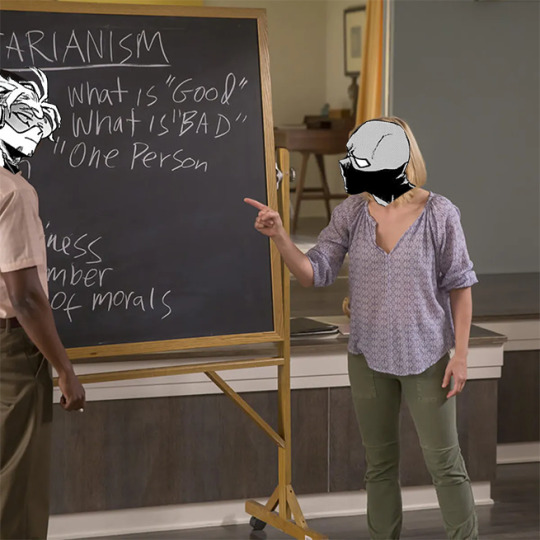
What is good?
What is bad?
What is the worth of one life?
That’s the question asked by the decision that Hawks makes to target twice. This post will look at the moral philosophies that overlap with those deicisions. @waxwingedhawks made a similiar post which you should check out, and while we might overlap I’ll be discussing different material. However the gist of this post is, even if Hawks decision was to prevent the deaths of thousands then is it worth it to kill a good man like Twice?
1. Should the Batman Kill Joker?
Slides taken from this powerpoint: [Source.]
There’s one famous example of ethics in hero comics that relates to this very issue of Hawks killing Twice. It’s especially relevant because Twice himself is a character based off the Joker, in that his whole life was changed by one bad day.
The ethical question is should batman kill the joker to put a permanent end to his crimes, and save the lives of everyone the Joker was going to kill in the future.
The quesetion itself demonstrates the conflict of Utiliarianism vs Deontology (or Kantian) when it comes to moral ethics. Utiliatiarnaism and Deontology are two opposing branches of ethics. And (this is simplifying here) the conflict between them arises from differing answers to this question? What is it that determines whether something is right or wrong.
Utiliarians believe that the results of an action are what determined if sometyhing is ethical or not. Therefore, this branch is called consequentialism because it states that the consequences of our actions define our actions. In other words the ends can be justified from the means.
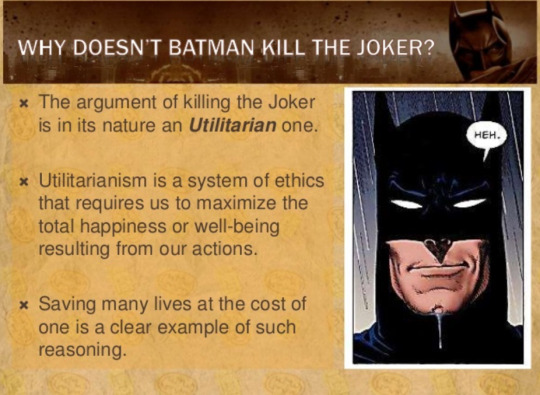
Deontologists believe that the means themselves are the ends. Batman’s no killing rule is a deontological one. Deontologist believe that morals are not determined by the results of our actions, but rather there are set rules outside of our actions that we choose to follow or ignore. A deontologist would say that nothing good can be achieved from unjust means.
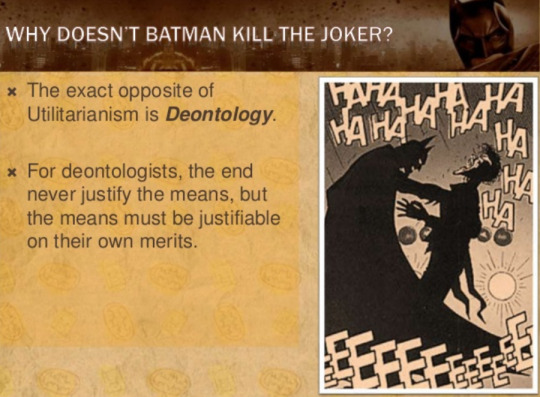
Batman believes killing is wrong, so he won’t kill the joker. The utilitarian argument is an appealing one. Batman could save so many lives if he just chose to bend his rule once. However, the appeal of utilitarianism is its flaw.
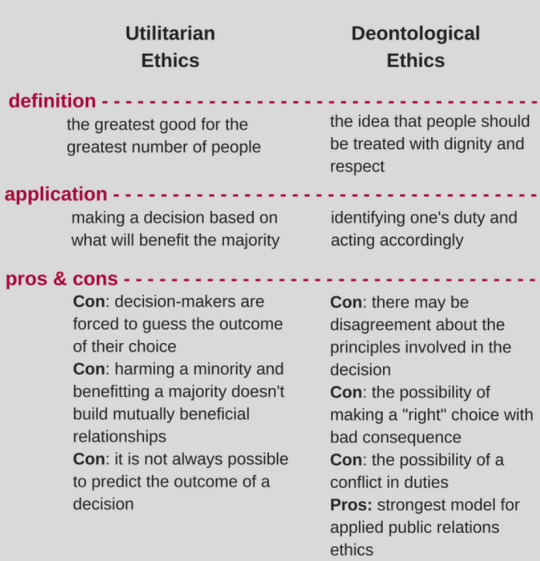
Utilitarianism summed up, is the greatest good for the greatest number of people. However, it pre-supposes that there is an objective greater good that the decision maker is working towards. Humans are fundamentally incapable of being objectives, and there’s no agreed upon objective “Greater Good”, its an idea that varies from person to person.
The problem with “the greater good” is that a lot can be seemingly justified towards it.
The reason batman doesn’t kill the joker, is the same reason crimminals are afforded civil liberties. It’s a deontological one. The idea that people always exist with certain rights, and should always be treated humanely is done for the sake of everybody. It’s not to let crimminals get away with crimes but rather to prevent innocent people from being wrongly persecuted.
For example you can use utilitarianism to justify putting cameras in people’s homes. If people never do anything wrong then there’s nothing to hide, right? Only the guilty will be punished. However, the reason we see this as a bad thing is because the definition of something wrong can change easily. If you put a camera in someone’s house, suddenly speaking badly about the government can be defined as something wrong, and you can be arrested for it.
As stated in the chart above, Utilitarianism is something that can quickly slide into harming a minority for the benefit of the majority.
To take another example from pop culture, there’s the famous scene in star trek 2 where Spock, a person who tries to live mainly by logical ideals rather than emotional one gives this famous quote.
Spock says, “Logic clearly dictates that the needs of the many outweigh the needs of the few.” Captain Kirk answers, “Or the one.”
However, while Star Trek is the source of this quote they also stated the exact opposite idea in the third movie, where every single characters comes together and puts themselves at risk to revive Spock. When Spock comes back to life, Kirk says the reverse.
“The needs of the one, outweigh the needs of the many.”
The third movie states while it may be true that one person’s life is worth sacrificing to help many people, the other is true as well. That many people can come together and risk their lives for the sake of saving one good man. The point being that the world doesn’t exist in strict utilitarian, or Detonological ideals, but rather we’re always working for a spectrum of both. People should make sacrifices for the greater good, and people should respect the individual needs of the minority are two ideas that only contradict each other in a world of black and white, in a world of heroes and villains.
2. Harming the Minority
So, once again returning to the ethical question set up by the Twice and Hawks conflict. Is saving perhaps thousands of people worth killing one good man?
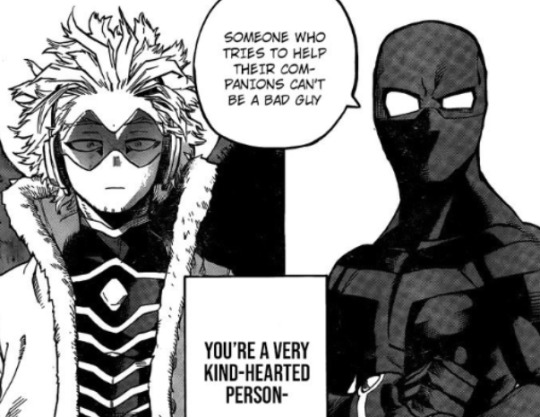
While Hawks is contemplating this question, the story gives us a very deontological rule. Someone who tries to help their companions can’t be a bad guy. Simply put, the act of helping other people is good, whether it comes from a hero, or a villain. In fact we’ve been shown this in the story before, Shigaraki is a murderer who lashes out at random, and he’s also a person who provided a home to several unstable people and helped them improve their lives, both of these ideas while contradictory exist at the same time.
Hawks and Twice’s beliefs contradict each other on a sociopolitical level. That is, both Hawks and Twice have a different idea on how society should be run. Hawks’ ideas are primarily collectivist, and Twice’s are individualist.

Hawks’ ideas are centered around two things, maximizing effiency, and the greater good. His goal has always been to save as many people as possible and to maximize the efficiency of his actions while doing so.

Hawks will always sacrifice the few for the sake of the many. What he believes, and what he was also specifically raised to believe is that he should be capable of saving everybody. That Hawks should devote all of himself to the sake of the people around him. The ideal of a hero, but not really a person. Hawks believes that whether people are saved or not lies entirely on him, and therefore he always maximizes the number of people he can save with every action.

Even sacrificing parts of himself with those decisions. When Hawks knows that he is not strong enough to kill the High End Noumu, intsead he sacrifices his wings (which are Hawks’ symbol of personal freedom) in order to give Endeavor the strength boost to defeat the villain. Hawks has to sacrifice himself. He always has to sacrifice himself for the many.

Which is why Hawks flies so fast. He genuinely believes (or rather was taught to believe) that if he works hard enough, if he sacrifices himself and is the perfect hero then he should be able to save the people he wants to save.

This is what makes Hawks the man who moves too fast. The reason other people can’t keep up with him is because they don’t devote absolutely all of themselves, to the point where they have no lives outside of their own work to the act of saving others.
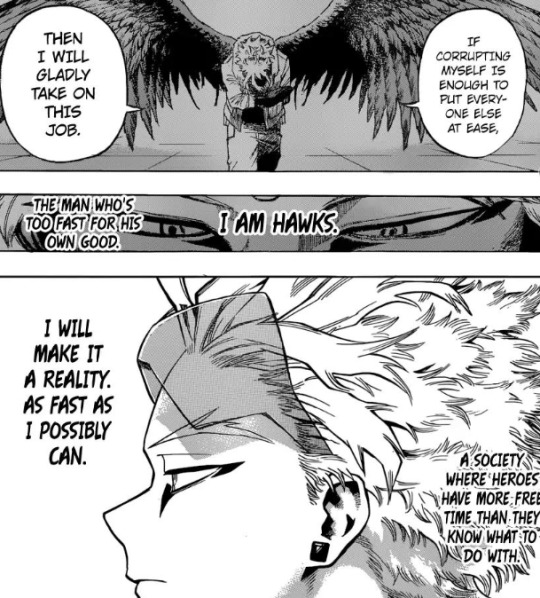
Hawks will always choose the selfless choice. Even the decision to kill is a selfless choice. You could argue that Batman not wanting to infringe upon his personal morals to kill Joker even though Joker might kill other people in the future is a selfish choice to make. Hawks would murder Joker in about ten seconds.
Hawks is a collectivst to the core. His argument is that personal feelings and invidual freedoms should be stomped all over if it’s something that benefits the whole of society.
The ideas of Twice and the liberation front as a whole are individualit ones. Basically, individual liberties should not be stepped all over for the process of the greater good.


The League of Villains and the Meta Liberation front are both a response to hero society’s tendency to let the minority suffer for the favor of the majority. I’ve spoken about this point before, but in the abstract the liberation front has broad, agreeable ideas.
Hero society is conformist in nature. People are often bullied because they do not fit the right kind of quirk.

In a society where literally everyone can shoot lasers out of their eyes, bullying people, intimidating them, pressuring them to conform is not necessarily the right answer. Collectivism works on the idea of there being an in-group and out-group. Obviously, for an in-group to even exist people have to be excluded.
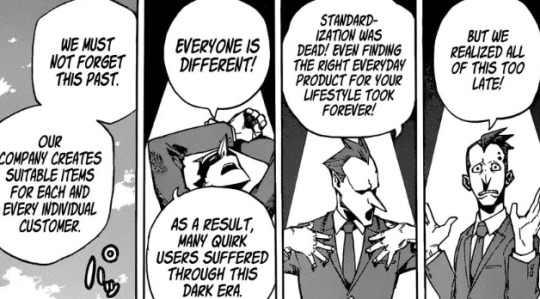
It would make more sense to run hero society from the angle of people have thousands of different types of quirks, we should do out best to maximize the inclusivity of society so that no one gets left out. The fact that people sympathize with the liberation army is because the current hero society, rather than trying to be accomodating to the differences between people and protecting the minority, instead chooses to oppress the minority and let people who could have been helped become villains because it’s just easier.
Which is what Twice’s backstory is entirely about. That even trying with your best intentions to turn your life around, you can fall out of society through no fault of your own.
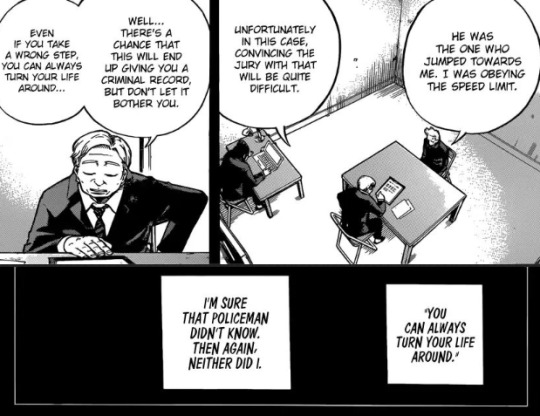
The idea that Twice became a villain not because he’s a good or bad person, but instead because of good or bad luck. Something that Twice really doesn’t have control over.

So, the LoV and MLA are an individualist response to an oppressively collectivist society as a whole. Those who cannot conform, want to destroy the current society that excludes them.
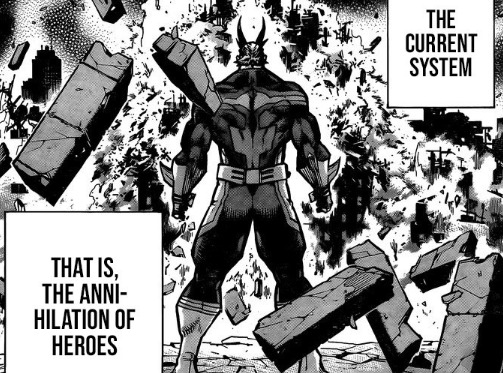
However, Twice values people’s feelings over the greater good of the mission, whereas Hawks will stomp all over his own feelings for the greater good of his mission the twist is that both of them are utiliatarians. Both Twice, and Hawks will justify murder in order to bring their ideal society in place. Twice’s philosophy sounds well and good that people who are outcasts should be taken care of, until you remember that Twice regularly wants to murder people in the name of protecting his small found family.
Twice still believes in a very unhealthy way that he needs to pay everybody back in the League of Villains for accepting him, by being useful to them. Even though the league cares about Twice’s feelings more than his use as a person, Twice still really sees himself the way that Hawks does. The only worth Twice has is a person is how useful he is to other. It’s just both of them justify their utilitarianism through different social viewpoints, Twice kills to protect the few, Hawks kills to protect the many.

3. The Death of a Good Man

Twice has stated these ideas before in the manga. First that he would never kill a friend, and second as what he told Hawks above a person who helps their friends can never be a bad guy. By Twice’s logic alone, Hawks betraying his friend makes him a bad person even if he is betraying that friend for good reasons.
For the final part of this meta I’m going to talk about the flaws of Utilitariansm. I’m going to use an example from another manga, Bungo Stray Dogs with the character Ango Sakaguchi.
In the second light novel we’re told the story of the Dark Era. To summarize, there are three people who work for the mafia, Dazai, Ango, and Oda. The three of them are drinking buddies, and sort-of-friends who meet outside of work and discuss. Eventually their work, or rather the system causes their friendship to fall into conflict.
Of these three people we have:
Oda, a handy man for the mafia taking care of orphans who has a person rule to never kill people directly, because he believes it’s an absolute wrong to kill someone.
Ango, a spy who incredibly similiar to Hawks will lie, manipulate, and deceive his own friends for the sake of what he always calls the greater good.
Dazai, a mafia executive who kills people and joined the mafia because he was suicidal and wanted to find a reason for himself to live.
Dazai and Ango exist on opposite sides of the political ideas spectrum, Dazai is an inidvidualist who only really thinks of himself, Ango thinks of the good of everybody as a collectivist at the cost of his individual relationships with his closest friend.
Oda is somewhere in the middle between them, however he’s acknowledged as a good person. The twist is Oda used to be an assassin that killed many people for whatever reason in the past. Just like Twice, he’s a dangerous crimminal. However, at the same time he was reforming himself, trying to be to a better person, and taking care of several orphans without a home. He had also stopped killing people at this point.
The story sacrifices one individual good man, in order to achieve what is called a “greater good” for everybody else.
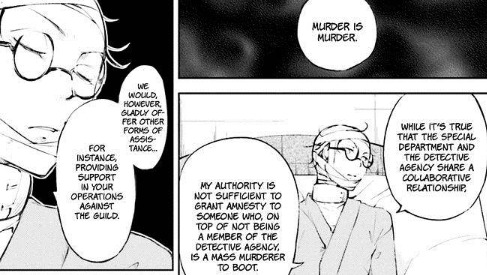
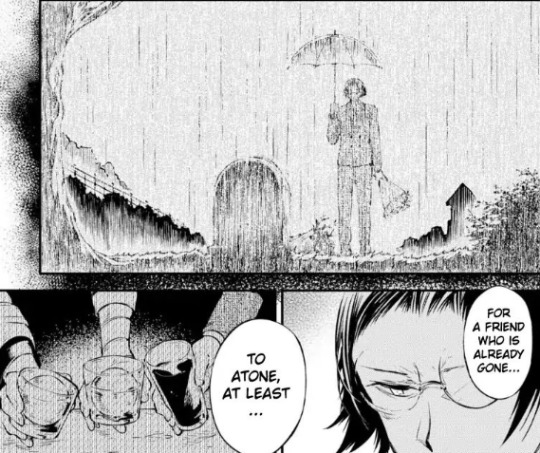
Ango is an individual with a strict and unbreakable moral code, always acting for the good of the majority. In a simple black and white story, he would be seen as a good person. However, not only did his actions result in the death of a good person, or at least a person trying to be good, all of the orphans Oda was trying to take care of died as well. That is a powerless minority was considered an acceptable sacrifice in order to maintain the status quo for a majority of people.
We see Ango make these choices again and again. To betray individual people for the sake of a faceless majority.

In the most recent chapter of the manga, he almost decided to shoot Atsushi in the head in order to make a quick decision to save as many people as possible. He even pretty much convinced himself that his only choice left was to murder Atsushi. Atsushi of course being… another powerless orphan with very little agency within society as a whole.
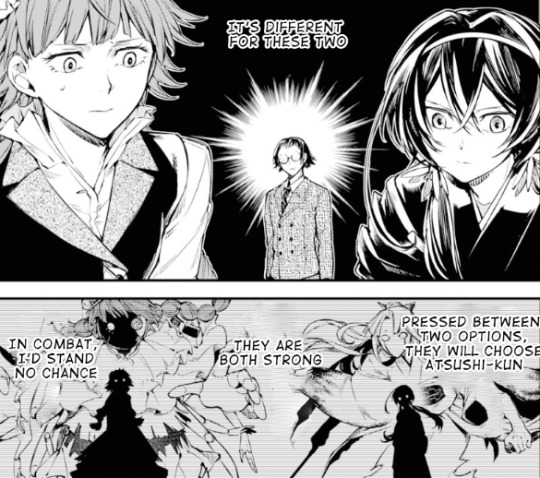
Ango would sacrifice Atsushi, someone who trusts him and is working with him if he thought it would help the greatst amount of people. Whereas, Lucy and Kyouka are people who would not kill Atsushi if they thought it would save people. They’d prioritize Atushi over the majority. Here we are coming into that conflict again.
However, as I’ve pointed out: the people who tend to be sacrificed are always in the minority. They would have been on the losing side regardless. Which is why true utilitarianism is impossible, because Ango is not making objective decisions here. He’s actually making very personal ones on the premise that he’s being objective. He keeps targetting over and over again peopele who are considered in the minority, and not only that Ango is very good at concinving himself he needs to do these things. Just as we witness Hawks convince himself that he needs personally to take out Twice.

Both of them are convinced that they are operating objectively, but instead are making very personal decisions. They have to be the one to pull the trigger themselves, Hawks corners Twice with a knife and Ango was ten seconds away from shooting Atsushi in the head the moment Atsushi stops being useful to him. Both of them repeat the worst flaws of their utilitarian mindset, by judging people based on their use to society as a whole rather than whether ot not they have the right to live and improve just for being people.
The counter to this logic is empathy. Twice is capable of murdering a lot of people, and has even done so in the past. However, at the same time that doesn’t make Twice a bad person, or a person capable of only doing bad things.
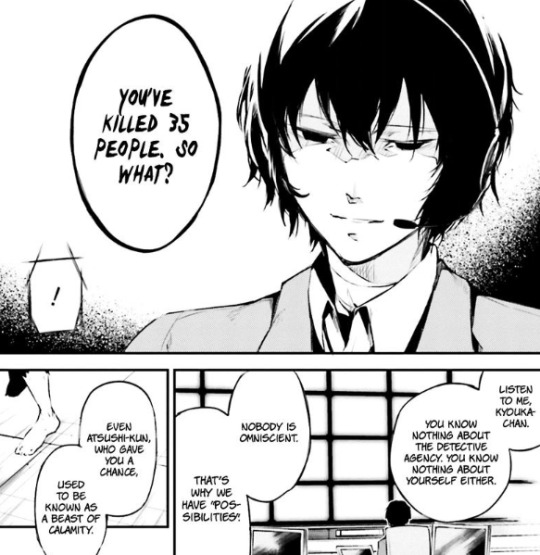
Opening your mind to the idea that people are both capable of good and evil depending on the circumstances, allows a person who has done bad things to be given the chance to do good things for the sake of others around them. Twice has done bad things in the name of the league, but it’s also Twice’s love and genuine compassion for others that has stabilized mentally a lot of the members of the league and allowed them to become better as people.

Someone capable of fighting to kill is also equally as capable of fighting to use that strength to protect. Basically, reality will always be at odds to ideals. Neither Hawks’ ideals nor Twice’s ideals allign with the reality that both of them exist in. Which is why there’s actually no need for them to fight each other.
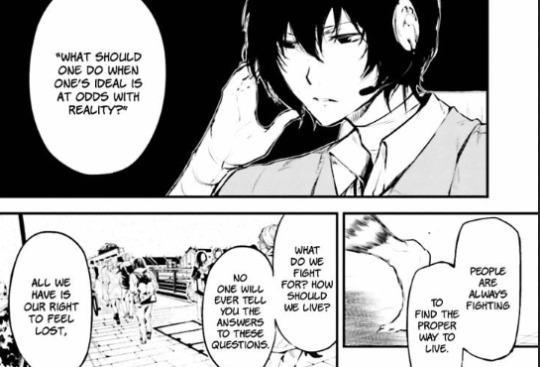

Empathy is the idea that everybody is struggling to live in their own way, that everybody is trying to live by their own means. Rather than forcing Hawks to Twice to fight, both of them could recognize that the other is struggling and needs help. Hawks needs someone to tell him that he deserves to be selfish, and take care of himself instead of continually sacrificing both himself and his emotions for the greater good. Twice needs someone to tell him that he doesn’t need to kill people, to be accepted by society. For both of them there are other options that exist, it’s just without empathy, without acknowledging the viewpoint of another person neither of them would ever be able to see those options.
What Hawks and Twice need isn’t for one of them to be right, and one of them to be wrong. They don’t need to fight and see who wins. What they need ultimately is each other to make up for what they are lacking individually. They are both victims with several things in common, while they’re capable of hurting each other because of what they have in common, they’re also equally capable of smypathizing with one another and helping to heal.

#hawks#takami keigo#twice#jin bubaigawara#my hero academia meta#league of villains meta#hawks meta#lov meta#philosophy#utilitarianism#deontology#collectivism#individualism#mha meta
409 notes
·
View notes
Text
The Untamed, episode 45 - watching notes
I'm at this stage of fandom rn where it's really hard to concentrate on anything else 😅
Every song I listen to gets dissected for how it relates to wangxian
I need to concentrate on my thesis but instead I'm pondering how the untamed raises questions about collectivism vs individualism and how my western perception of that might differ greatly from a native chinese person or even the author's intention
Can't I just write my thesis about THAT?
Alas, I digress ...
Back to our regular programming :D
Last time one Sophie watches the untamed wwx went all Sherlock on us and used his formidable skills of deduction to expose Backpfeifengesicht's plan of killing everyone and blaming it on wwx
I've heard from several people that the next few episodes are their favourites, so no high expectations at all :D
Nobody wipes the blood on their chins away. Might be about the aesthetic
I adore detective-duo-wangxian so much!! Especially because wwx does 99% of the talking but then lwj will chime in with a single word and it's 100% devastating :D
If anyone knows any well written case-fics for these two, please, I need recs! (For after the show)
Backpfeifengesicht makes good one point and that is that jgy already is at the top of the cultivation world. So what does he gain from all this?
Or is it simply that he's afraid of wwx because he's a rebel and might act against him? (Don't answer that. I wanna find out through the show ;))
Wwx just casually revealed that he's been to cloud recess and that he handles went to the restricted section forbidden chamber. What will you do about, Lan Qiren? Huh? 😂
Oooh! Backpfeifengesicht is the ghosted faced man! I thought it was Jiggy himself!!! 😱
That makes way more sense though!
Lan Sizhui! Jin Ling! Oh you brave boys! 😭
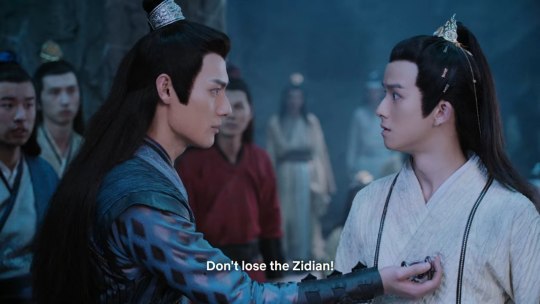
Someone hold me 😭
But why does he not take zidian now? He's done so before!
"You little fool!" Is "I love you" in Jiang-Cheng-speak :D
"We're done for! What can we do??" - wwx *strips*
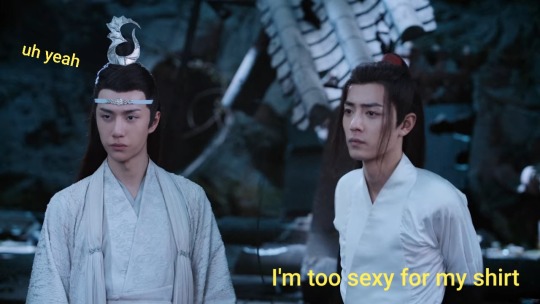
Sorry
Bahahaha 😂😂😂
I just burst out laughing waaay to loudly for the fact that I've got people sleeping in the room next to mine
But look at Lan Qiren when he sees wwx strop to reveal anat is probably his nephew's undershirt 😂😂😂
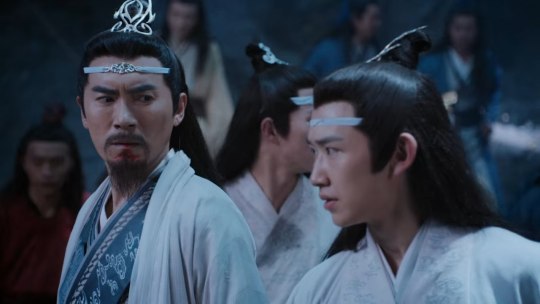
He's probably questioning every decision that's let him to this point :D

This is completely inconsequential,but I couldn't keep quiet about it anymore because I every time he makes this motion, it always sends a shiver down my spine!!! Notice that wwx (or rather Xiao Zhan) is one of these people whose fingers bend in the opposite direction??? I know it's just a normal thing some people can do, but I can't watch it!! It makes my fingers hurt just looking at it 🙈🙈🙈
Is he turning himself into a demon lure flag?? 😱
Lan Jingyi 🥺🥺🥺
Also does wwx now just transfer his self-sacrificing tendencies to lwj?
Nothing is as hot as these two together in a fight scene
Jiang Cheng doesn't want to leave them behind. He does care! :') he just never unlearned how to unravel his love from his anger
Sizhui running up to greet his dads :')

Look at them! I'm soft guys 💔
He called him Yuan!! 😭😭😭
So this is it. Any doubts I ever had about Sizhui's identity are gone
Will he finally recognize him??
Why don't you say anything lwj? This one time, I beg you!!
Sect Leader Yao still at his gossip shit even 16 years later 🙄
Lam sizhyi is seasick! Why is this so cute! 😭
Oh Wen Ning!! He recognized A-Yuan? Right?
I want to hug Lan Sizhui for his openness and kindness towards everyone he meets, no matter their status or what other people say about them! (Wen Ning now or who he thought was Mo Xuanyu the supposed mad-man) and I wanna hug lan Wangji right after for raising him to be like this :')
Oh Wen Ning! 😭
That's how I'd look at Sizhui, too, if I met him - poor unadulterated wonder :')
And just think about what that means for Wen Ning! He's not the last of the Wens! All their fight wasn't for nothing. This child, their legacy, survived 😭😭😭
"Can I call you A-Yuan" "Of Course." God I'm gonna burst into tears 😭
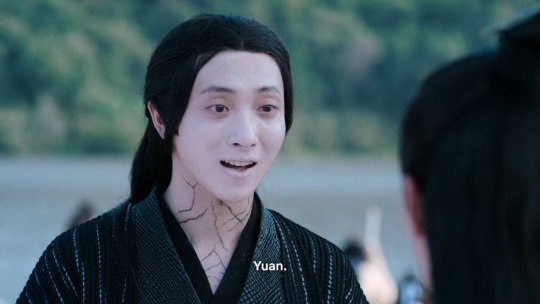
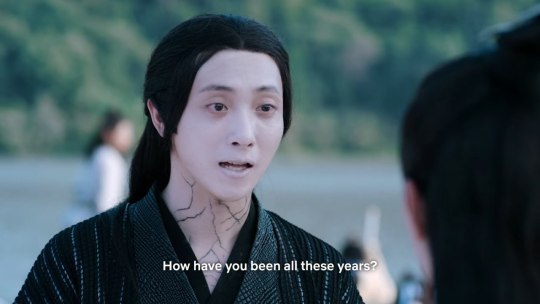
I'm actually bursting into tears!!
Isn't this the dream of anyone who has ever lost someone? :')
"He's like a brother and father to me" :')
And he raised him from when he was 4 or 5? So ... A-Yuan was about 2 when the Wens died? Right? Then 5 would fit with lwj's 3 year isolation
Ob god, it's the butterfly-toy!!! 😭😭😭
Wen Nings smiling through his tears! I can't! 😭💔And he's got the one from the market!
Aww, wax isn't wearing the white undergarment anymore. Too bad
Oh poor Jin Ling ...
So much grieve that he could probably never process. There so many lost kids in this story, hurt by things they had no control over 😔
I mean, I get it. That's the person who killed his parents (without being in control, but he doesnt know that) and everyone is just talking to him as if it's normal and that didn't happen. But he can't forget,but he doesnt really understand either and he has no outlet. Of course he'd just ... crash 😥
And who would have thought I'd ever try at a flashback of Jin Zixuan's death :(
For once, it'd be nice if the adults actually acted like the parent figures they're supposed to be and explain things to their children 🤦♀️
I'm so thankful though, that no one even thinks of scolding him for crying. Jismg Cheng only asked who it was that made him cry (and looks like he'll kick their ass). Generally, thus show has a very healthy attitude towards tears. Most characters cry when they are faced with tragedy, regardless of gender. Men being allowed to have appropriate reactions to grieve (instead of a single men tear or just punching things) is really nice to see
Oh Yao dude whose courtesy name I can't remember, shut up!
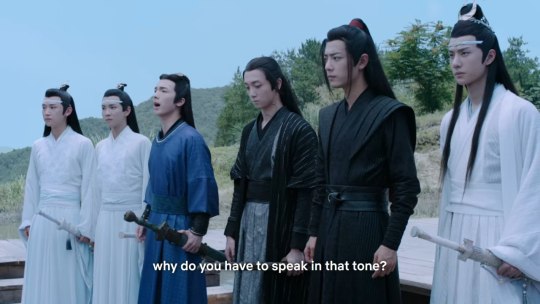
Thanks Ouyang Zizhen! You get me
I live for these children standing up to their elders
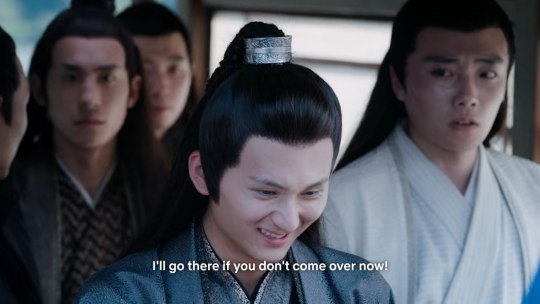
Meanwhile Nie Huaisang is just on the sidelines, enjoying the show :D never change!
The Lotus Pier theme song alone is making me cry rn 😢
Why can't wen Ning come in?
Oh Sizhui!
He many times do you want to make me cry happy tears today?? :')
Little turnip-baby ❤

But why doesn't lwj say anything ??? 😭
Lan Wangji raised A-Yuan smong a bunch of rabbits??? 😭
Now he's a turnip baby with a taste for carrots, how cute is that? :')
Holy shit, wwx and lwj are really joined at the hip these days of lwj won't enter the hall if wwx isn't allowed to :D
Lwj 😑 "no misbehaviour"
Someone. Knows. Their. Husband.
Okay sorry, but as painful as these cuts must have been and yes, while you do see scars on this prostitute's face, they in no way warrant these horrified gasps as of they had all seen a monster 🙄
Xue yang. Fancy seeing you here in this not at all disturbing sub-plot 😬
Okay that's creepy. That's really creepy
Shouldn't Jin Guangyao have a bit more compassion for these women?
On the other hand, he was born to menacingly stand behind a curtain 🤷♀️
W. T. F. ????
Jin Guangshan??? o___O
That's the most skin we've ever seen on this show and it's in a scene like THIS? 😬
THIS IS HOW JIN GUANGSHAN DIED? 😱😱😱
How?
How can you die from sex?
And then jgy made them keep going?
UGH
These poor women :/
So there's someone who set her free on purpose, right?
Bicao has really interesting eyes!
Oh wait, took me some time to catch up. This is about Quin Su and why she killed herself, right?
WHAT??
They were siblings o_O
They just went full game of thrones on this ...
Hey Jin Guangshan, screw you for raping that woman
Wait, is that why jgy had him die like THAT?
I'm so confused about how that happened btw
But why would Jin Guangyao merry quin su anyway? Was this some kind of political marriage that he couldn't call off?
This episode answered some of my questions but raised about a dozen more 😅
@sweetlittlevampire @fandom-glazed @elenirlachlagos @allhailthedramallama @luckymoony @kyrrahbird @i-love-him-on-purpose
5 episodes to go. I'm both happy because I can't wait to brows the untamed tag without looking for spoilers and extremely sad 🥺
Right now I'm planning to watch one episode each day until friday and then watch the last two on Saturday, hopefully quite early, so I can spend the rest of the day crying my eyes out over it, without having to worry about such trivial things as being a functioning adult or a responsible student 😅
#the untamed#sophie watches the untamed#wei wuxian#wwx#lan wangji#lwj#wangxian#jiang cheng#jin ling#lan sizhui#wen ning#a-yuan#(I'm so happy i can put this tag here again 😊)#jin guangshan#jin guangyao#ouyang zizhen#the untamed liveblog
123 notes
·
View notes
Link
Timothy Snyder [don't miss a word]
When Donald Trump stood before his followers on Jan. 6 and urged them to march on the United States Capitol, he was doing what he had always done. He never took electoral democracy seriously nor accepted the legitimacy of its American version. Even when he won, in 2016, he insisted that the election was fraudulent — that millions of false votes were cast for his opponent. In 2020, in the knowledge that he was trailing Joseph R. Biden in the polls, he spent months claiming that the presidential election would be rigged and signaling that he would not accept the results if they did not favor him. He wrongly claimed on Election Day that he had won and then steadily hardened his rhetoric: With time, his victory became a historic landslide and the various conspiracies that denied it ever more sophisticated and implausible.
People believed him, which is not at all surprising. It takes a tremendous amount of work to educate citizens to resist the powerful pull of believing what they already believe, or what others around them believe, or what would make sense of their own previous choices. Plato noted a particular risk for tyrants: that they would be surrounded in the end by yes-men and enablers. Aristotle worried that, in a democracy, a wealthy and talented demagogue could all too easily master the minds of the populace. Aware of these risks and others, the framers of the Constitution instituted a system of checks and balances. The point was not simply to ensure that no one branch of government dominated the others but also to anchor in institutions different points of view.
In this sense, the responsibility for Trump’s push to overturn an election must be shared by a very large number of Republican members of Congress. Rather than contradict Trump from the beginning, they allowed his electoral fiction to flourish. They had different reasons for doing so. One group of Republicans is concerned above all with gaming the system to maintain power, taking full advantage of constitutional obscurities, gerrymandering and dark money to win elections with a minority of motivated voters. They have no interest in the collapse of the peculiar form of representation that allows their minority party disproportionate control of government. The most important among them, Mitch McConnell, indulged Trump’s lie while making no comment on its consequences.
Yet other Republicans saw the situation differently: They might actually break the system and have power without democracy. The split between these two groups, the gamers and the breakers, became sharply visible on Dec. 30, when Senator Josh Hawley announced that he would support Trump’s challenge by questioning the validity of the electoral votes on Jan. 6. Ted Cruz then promised his own support, joined by about 10 other senators. More than a hundred Republican representatives took the same position. For many, this seemed like nothing more than a show: challenges to states’ electoral votes would force delays and floor votes but would not affect the outcome.
Yet for Congress to traduce its basic functions had a price. An elected institution that opposes elections is inviting its own overthrow. Members of Congress who sustained the president’s lie, despite the available and unambiguous evidence, betrayed their constitutional mission. Making his fictions the basis of congressional action gave them flesh. Now Trump could demand that senators and congressmen bow to his will. He could place personal responsibility upon Mike Pence, in charge of the formal proceedings, to pervert them. And on Jan. 6, he directed his followers to exert pressure on these elected representatives, which they proceeded to do: storming the Capitol building, searching for people to punish, ransacking the place.
Of course this did make a kind of sense: If the election really had been stolen, as senators and congressmen were themselves suggesting, then how could Congress be allowed to move forward? For some Republicans, the invasion of the Capitol must have been a shock, or even a lesson. For the breakers, however, it may have been a taste of the future. Afterward, eight senators and more than 100 representatives voted for the lie that had forced them to flee their chambers.Post-truth is pre-fascism, and Trump has been our post-truth president. When we give up on truth, we concede power to those with the wealth and charisma to create spectacle in its place. Without agreement about some basic facts, citizens cannot form the civil society that would allow them to defend themselves. If we lose the institutions that produce facts that are pertinent to us, then we tend to wallow in attractive abstractions and fictions.
Truth defends itself particularly poorly when there is not very much of it around, and the era of Trump — like the era of Vladimir Putin in Russia — is one of the decline of local news. Social media is no substitute: It supercharges the mental habits by which we seek emotional stimulation and comfort, which means losing the distinction between what feels true and what actually is true.Post-truth wears away the rule of law and invites a regime of myth. These last four years, scholars have discussed the legitimacy and value of invoking fascism in reference to Trumpian propaganda. One comfortable position has been to label any such effort as a direct comparison and then to treat such comparisons as taboo. More productively, the philosopher Jason Stanley has treated fascism as a phenomenon, as a series of patterns that can be observed not only in interwar Europe but beyond it.
My own view is that greater knowledge of the past, fascist or otherwise, allows us to notice and conceptualize elements of the present that we might otherwise disregard and to think more broadly about future possibilities. It was clear to me in October that Trump’s behavior presaged a coup, and I said so in print; this is not because the present repeats the past, but because the past enlightens the present.Like historical fascist leaders, Trump has presented himself as the single source of truth. His use of the term “fake news” echoed the Nazi smear Lügenpresse (“lying press”); like the Nazis, he referred to reporters as “enemies of the people.” Like Adolf Hitler, he came to power at a moment when the conventional press had taken a beating; the financial crisis of 2008 did to American newspapers what the Great Depression did to German ones. The Nazis thought that they could use radio to replace the old pluralism of the newspaper; Trump tried to do the same with Twitter.
Thanks to technological capacity and personal talent, Donald Trump lied at a pace perhaps unmatched by any other leader in history. For the most part these were small lies, and their main effect was cumulative. To believe in all of them was to accept the authority of a single man, because to believe in all of them was to disbelieve everything else. Once such personal authority was established, the president could treat everyone else as the liars; he even had the power to turn someone from a trusted adviser into a dishonest scoundrel with a single tweet. Yet so long as he was unable to enforce some truly big lie, some fantasy that created an alternative reality where people could live and die, his pre-fascism fell short of the thing itself.
Some of his lies were, admittedly, medium-size: that he was a successful businessman; that Russia did not support him in 2016; that Barack Obama was born in Kenya. Such medium-size lies were the standard fare of aspiring authoritarians in the 21st century. In Poland the right-wing party built a martyrdom cult around assigning blame to political rivals for an airplane crash that killed the nation’s president. Hungary’s Viktor Orban blames a vanishingly small number of Muslim refugees for his country’s problems. But such claims were not quite big lies; they stretched but did not rend what Hannah Arendt called “the fabric of factuality.”
One historical big lie discussed by Arendt is Joseph Stalin’s explanation of starvation in Soviet Ukraine in 1932-33. The state had collectivized agriculture, then applied a series of punitive measures to Ukraine that ensured millions would die. Yet the official line was that the starving were provocateurs, agents of Western powers who hated socialism so much they were killing themselves. A still grander fiction, in Arendt’s account, is Hitlerian anti-Semitism: the claims that Jews ran the world, Jews were responsible for ideas that poisoned German minds, Jews stabbed Germany in the back during the First World War. Intriguingly, Arendt thought big lies work only in lonely minds; their coherence substitutes for experience and companionship.In November 2020, reaching millions of lonely minds through social media, Trump told a lie that was dangerously ambitious: that he had won an election that in fact he had lost.
This lie was big in every pertinent respect: not as big as “Jews run the world,” but big enough. The significance of the matter at hand was great: the right to rule the most powerful country in the world and the efficacy and trustworthiness of its succession procedures. The level of mendacity was profound. The claim was not only wrong, but it was also made in bad faith, amid unreliable sources. It challenged not just evidence but logic: Just how could (and why would) an election have been rigged against a Republican president but not against Republican senators and representatives? Trump had to speak, absurdly, of a “Rigged (for President) Election.”
The force of a big lie resides in its demand that many other things must be believed or disbelieved. To make sense of a world in which the 2020 presidential election was stolen requires distrust not only of reporters and of experts but also of local, state and federal government institutions, from poll workers to elected officials, Homeland Security and all the way to the Supreme Court. It brings with it, of necessity, a conspiracy theory: Imagine all the people who must have been in on such a plot and all the people who would have had to work on the cover-up.Trump’s electoral fiction floats free of verifiable reality. It is defended not so much by facts as by claims that someone else has made some claims. The sensibility is that something must be wrong because I feel it to be wrong, and I know others feel the same way. When political leaders such as Ted Cruz or Jim Jordan spoke like this, what they meant was: You believe my lies, which compels me to repeat them. Social media provides an infinity of apparent evidence for any conviction, especially one seemingly held by a president.
On the surface, a conspiracy theory makes its victim look strong: It sees Trump as resisting the Democrats, the Republicans, the Deep State, the pedophiles, the Satanists. More profoundly, however, it inverts the position of the strong and the weak. Trump’s focus on alleged “irregularities” and “contested states” comes down to cities where Black people live and vote. At bottom, the fantasy of fraud is that of a crime committed by Black people against white people.It’s not just that electoral fraud by African-Americans against Donald Trump never happened. It is that it is the very opposite of what happened, in 2020 and in every American election. As always, Black people waited longer than others to vote and were more likely to have their votes challenged. They were more likely to be suffering or dying from Covid-19, and less likely to be able to take time away from work. The historical protection of their right to vote has been removed by the Supreme Court’s 2013 ruling in Shelby County v. Holder, and states have rushed to pass measures of a kind that historically reduce voting by the poor and communities of color.
The claim that Trump was denied a win by fraud is a big lie not just because it mauls logic, misdescribes the present and demands belief in a conspiracy. It is a big lie, fundamentally, because it reverses the moral field of American politics and the basic structure of American history.
When Senator Ted Cruz announced his intention to challenge the Electoral College vote, he invoked the Compromise of 1877, which resolved the presidential election of 1876. Commentators pointed out that this was no relevant precedent, since back then there really were serious voter irregularities and there really was a stalemate in Congress. For African-Americans, however, the seemingly gratuitous reference led somewhere else. The Compromise of 1877 — in which Rutherford B. Hayes would have the presidency, provided that he withdrew federal power from the South — was the very arrangement whereby African-Americans were driven from voting booths for the better part of a century. It was effectively the end of Reconstruction, the beginning of segregation, legal discrimination and Jim Crow. It is the original sin of American history in the post-slavery era, our closest brush with fascism so far.If the reference seemed distant when Ted Cruz and 10 senatorial colleagues released their statement on Jan. 2, it was brought very close four days later, when Confederate flags were paraded through the Capitol.
Some things have changed since 1877, of course. Back then, it was the Republicans, or many of them, who supported racial equality; it was the Democrats, the party of the South, who wanted apartheid. It was the Democrats, back then, who called African-Americans’ votes fraudulent, and the Republicans who wanted them counted. This is now reversed. In the past half century, since the Civil Rights Act, Republicans have become a predominantly white party interested — as Trump openly declared — in keeping the number of voters, and particularly the number of Black voters, as low as possible. Yet the common thread remains. Watching white supremacists among the people storming the Capitol, it was easy to yield to the feeling that something pure had been violated. It might be better to see the episode as part of a long American argument about who deserves representation.
The Democrats, today, have become a coalition, one that does better than Republicans with female and nonwhite voters and collects votes from both labor unions and the college-educated. Yet it’s not quite right to contrast this coalition with a monolithic Republican Party. Right now, the Republican Party is a coalition of two types of people: those who would game the system (most of the politicians, some of the voters) and those who dream of breaking it (a few of the politicians, many of the voters). In January 2021, this was visible as the difference between those Republicans who defended the present system on the grounds that it favored them and those who tried to upend it.In the four decades since the election of Ronald Reagan, Republicans have overcome the tension between the gamers and the breakers by governing in opposition to government, or by calling elections a revolution (the Tea Party), or by claiming to oppose elites. The breakers, in this arrangement, provide cover for the gamers, putting forth an ideology that distracts from the basic reality that government under Republicans is not made smaller but simply diverted to serve a handful of interests.
At first, Trump seemed like a threat to this balance. His lack of experience in politics and his open racism made him a very uncomfortable figure for the party; his habit of continually telling lies was initially found by prominent Republicans to be uncouth. Yet after he won the presidency, his particular skills as a breaker seemed to create a tremendous opportunity for the gamers. Led by the gamer in chief, McConnell, they secured hundreds of federal judges and tax cuts for the rich.
Trump was unlike other breakers in that he seemed to have no ideology. His objection to institutions was that they might constrain him personally. He intended to break the system to serve himself — and this is partly why he has failed. Trump is a charismatic politician and inspires devotion not only among voters but among a surprising number of lawmakers, but he has no vision that is greater than himself or what his admirers project upon him. In this respect his pre-fascism fell short of fascism: His vision never went further than a mirror. He arrived at a truly big lie not from any view of the world but from the reality that he might lose something.
Yet Trump never prepared a decisive blow. He lacked the support of the military, some of whose leaders he had alienated. (No true fascist would have made the mistake he did there, which was to openly love foreign dictators; supporters convinced that the enemy was at home might not mind, but those sworn to protect from enemies abroad did.) Trump’s secret police force, the men carrying out snatch operations in Portland, was violent but also small and ludicrous. Social media proved to be a blunt weapon: Trump could announce his intentions on Twitter, and white supremacists could plan their invasion of the Capitol on Facebook or Gab.
But the president, for all his lawsuits and entreaties and threats to public officials, could not engineer a situation that ended with the right people doing the wrong thing. Trump could make some voters believe that he had won the 2020 election, but he was unable to bring institutions along with his big lie. And he could bring his supporters to Washington and send them on a rampage in the Capitol, but none appeared to have any very clear idea of how this was to work or what their presence would accomplish. It is hard to think of a comparable insurrectionary moment, when a building of great significance was seized, that involved so much milling around.
The lie outlasts the liar. The idea that Germany lost the First World War in 1918 because of a Jewish “stab in the back” was 15 years old when Hitler came to power. How will Trump’s myth of victimhood function in American life 15 years from now? And to whose benefit?
On Jan. 7, Trump called for a peaceful transition of power, implicitly conceding that his putsch had failed. Even then, though, he repeated and even amplified his electoral fiction: It was now a sacred cause for which people had sacrificed. Trump’s imagined stab in the back will live on chiefly thanks to its endorsement by members of Congress. In November and December 2020, Republicans repeated it, giving it a life it would not otherwise have had. In retrospect, it now seems as though the last shaky compromise between the gamers and the breakers was the idea that Trump should have every chance to prove that wrong had been done to him. That position implicitly endorsed the big lie for Trump supporters who were inclined to believe it. It failed to restrain Trump, whose big lie only grew bigger.
The breakers and the gamers then saw a different world ahead, where the big lie was either a treasure to be had or a danger to be avoided. The breakers had no choice but to rush to be first to claim to believe in it. Because the breakers Josh Hawley and Ted Cruz must compete to claim the brimstone and bile, the gamers were forced to reveal their own hand, and the division within the Republican coalition became visible on Jan. 6. The invasion of the Capitol only reinforced this division. To be sure, a few senators withdrew their objections, but Cruz and Hawley moved forward anyway, along with six other senators. More than 100 representatives doubled down on the big lie. Some, like Matt Gaetz, even added their own flourishes, such as the claim that the mob was led not by Trump’s supporters but by his opponents.Trump is, for now, the martyr in chief, the high priest of the big lie. He is the leader of the breakers, at least in the minds of his supporters. By now, the gamers do not want Trump around. Discredited in his last weeks, he is useless; shorn of the obligations of the presidency, he will become embarrassing again, much as he was in 2015. Unable to provide cover for their gamesmanship, he will be irrelevant to their daily purposes. But the breakers have an even stronger reason to see Trump disappear: It is impossible to inherit from someone who is still around. Seizing Trump’s big lie might appear to be a gesture of support. In fact it expresses a wish for his political death. Transforming the myth from one about Trump to one about the nation will be easier when he is out of the way.
As Cruz and Hawley may learn, to tell the big lie is to be owned by it. Just because you have sold your soul does not mean that you have driven a hard bargain. Hawley shies from no level of hypocrisy; the son of a banker, educated at Stanford University and Yale Law School, he denounces elites. Insofar as Cruz was thought to have a principle, it was that of states’ rights, which Trump’s calls to action brazenly violated. A joint statement Cruz issued about the senators’ challenge to the vote nicely captured the post-truth aspect of the whole: It never alleged that there was fraud, only that there were allegations of fraud. Allegations of allegations, allegations all the way down.The big lie requires commitment. When Republican gamers do not exhibit enough of that, Republican breakers call them “RINOs”: Republicans in name only. This term once suggested a lack of ideological commitment. It now means an unwillingness to throw away an election. The gamers, in response, close ranks around the Constitution and speak of principles and traditions. The breakers must all know (with the possible exception of the Alabama senator Tommy Tuberville) that they are participating in a sham, but they will have an audience of tens of millions who do not.
If Trump remains present in American political life, he will surely repeat his big lie incessantly. Hawley and Cruz and the other breakers share responsibility for where this leads. Cruz and Hawley seem to be running for president. Yet what does it mean to be a candidate for office and denounce voting? If you claim that the other side has cheated, and your supporters believe you, they will expect you to cheat yourself. By defending Trump’s big lie on Jan. 6, they set a precedent: A Republican presidential candidate who loses an election should be appointed anyway by Congress. Republicans in the future, at least breaker candidates for president, will presumably have a Plan A, to win and win, and a Plan B, to lose and win. No fraud is necessary; only allegations that there are allegations of fraud. Truth is to be replaced by spectacle, facts by faith.Trump’s coup attempt of 2020-21, like other failed coup attempts, is a warning for those who care about the rule of law and a lesson for those who do not. His pre-fascism revealed a possibility for American politics. For a coup to work in 2024, the breakers will require something that Trump never quite had: an angry minority, organized for nationwide violence, ready to add intimidation to an election. Four years of amplifying a big lie just might get them this. To claim that the other side stole an election is to promise to steal one yourself. It is also to claim that the other side deserves to be punished.Informed observers inside and outside government agree that right-wing white supremacism is the greatest terrorist threat to the United States.
Gun sales in 2020 hit an astonishing high. History shows that political violence follows when prominent leaders of major political parties openly embrace paranoia.Our big lie is typically American, wrapped in our odd electoral system, depending upon our particular traditions of racism. Yet our big lie is also structurally fascist, with its extreme mendacity, its conspiratorial thinking, its reversal of perpetrators and victims and its implication that the world is divided into us and them. To keep it going for four years courts terrorism and assassination.
When that violence comes, the breakers will have to react. If they embrace it, they become the fascist faction. The Republican Party will be divided, at least for a time. One can of course imagine a dismal reunification: A breaker candidate loses a narrow presidential election in November 2024 and cries fraud, the Republicans win both houses of Congress and rioters in the street, educated by four years of the big lie, demand what they see as justice. Would the gamers stand on principle if those were the circumstances of Jan. 6, 2025?To be sure, this moment is also a chance. It is possible that a divided Republican Party might better serve American democracy; that the gamers, separated from the breakers, might start to think of policy as a way to win elections. It is very likely that the Biden-Harris administration will have an easier first few months than expected; perhaps obstructionism will give way, at least among a few Republicans and for a short time, to a moment of self-questioning.
Politicians who want Trumpism to end have a simple way forward: Tell the truth about the election.America will not survive the big lie just because a liar is separated from power. It will need a thoughtful repluralization of media and a commitment to facts as a public good. The racism structured into every aspect of the coup attempt is a call to heed our own history. Serious attention to the past helps us to see risks but also suggests future possibility. We cannot be a democratic republic if we tell lies about race, big or small.Democracy is not about minimizing the vote nor ignoring it, neither a matter of gaming nor of breaking a system, but of accepting the equality of others, heeding their voices and counting their votes.
#trump#donald j#political#NYTimes#insurrection#January 6 2020#corrupt GOP#Criminal GOP#analysis#sedition
9 notes
·
View notes